英语单词快速记忆-刘毅字根字典
- 格式:doc
- 大小:140.00 KB
- 文档页数:15
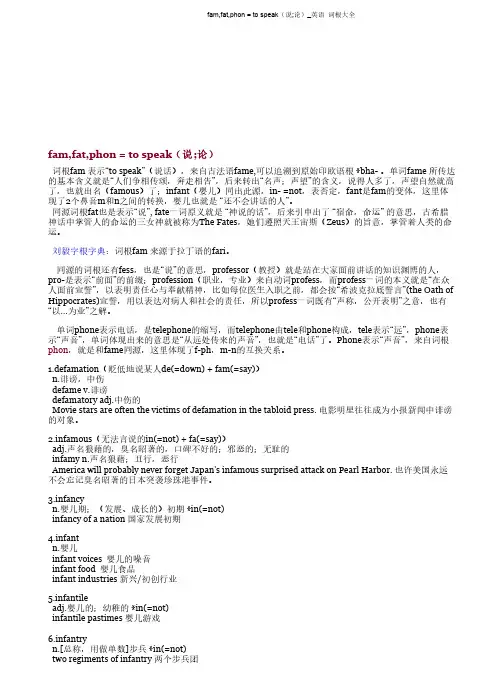
fam,fat,phon = to speak(说;论)词根fam 表示“to speak”(说话),来自古法语fame,可以追溯到原始印欧语根 *bha- 。
单词fame 所传达的基本含义就是“人们争相传颂,奔走相告”,后来转出“名声;声望”的含义,说得人多了,声望自然就高了,也就出名(famous)了;infant(婴儿)同出此源,in- =not,表否定,fant是fam的变体,这里体现了2个鼻音m和n之间的转换,婴儿也就是 “还不会讲话的人”。
同源词根fat也是表示“说”, fate一词原义就是 “神说的话”,后来引申出了 “宿命,命运” 的意思,古希腊神话中掌管人的命运的三女神就被称为The Fates,她们遵照天王宙斯(Zeus)的旨意,掌管着人类的命运。
刘毅字根字典:词根fam 来源于拉丁语的fari。
同源的词根还有fess,也是“说”的意思,professor(教授)就是站在大家面前讲话的知识渊博的人,pro-是表示“前面”的前缀;profession(职业,专业)来自动词profess,而profess一词的本义就是“在众人面前宣誓”,以表明责任心与奉献精神,比如每位医生入职之前,都会按“希波克拉底誓言”(the Oath of Hippocrates)宣誓,用以表达对病人和社会的责任,所以profess一词既有“声称,公开表明”之意,也有“以…为业”之解。
单词phone表示电话,是telephone的缩写,而telephone由tele和phone构成,tele表示“远”,phone表示“声音”,单词体现出来的意思是“从远处传来的声音”,也就是“电话”了。
Phone表示“声音”,来自词根phon,就是和fame同源,这里体现了f-ph,m-n的互换关系。
1.defamation(贬低地说某人de(=down) + fam(=say))n.诽谤,中伤defame v.诽谤defamatory adj.中伤的Movie stars are often the victims of defamation in the tabloid press. 电影明星往往成为小报新闻中诽谤的对象。
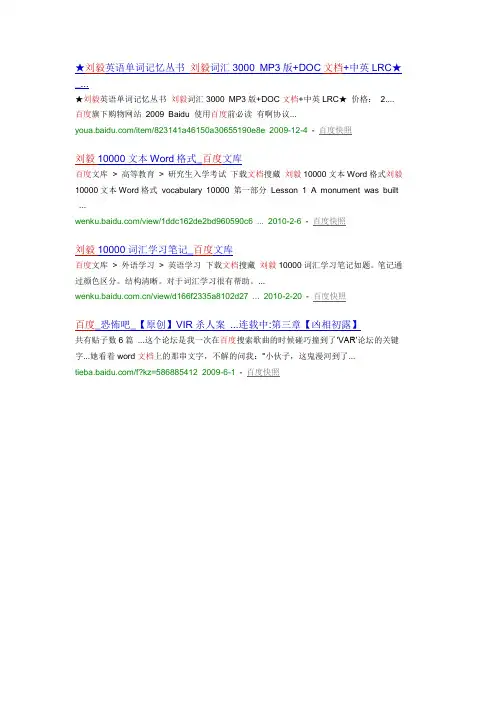
★刘毅英语单词记忆丛书刘毅词汇3000 MP3版+DOC文档+中英LRC★_...
★刘毅英语单词记忆丛书刘毅词汇3000 MP3版+DOC文档+中英LRC★价格: 2.... 百度旗下购物网站2009 Baidu 使用百度前必读有啊协议...
/item/823141a46150a30655190e8e 2009-12-4 - 百度快照
刘毅10000文本Word格式_百度文库
百度文库> 高等教育> 研究生入学考试下载文档搜藏刘毅10000文本Word格式刘毅10000文本Word格式vocabulary 10000 第一部分Lesson 1 A monument was built ...
/view/1ddc162de2bd960590c6 ... 2010-2-6 - 百度快照
刘毅10000词汇学习笔记_百度文库
百度文库> 外语学习> 英语学习下载文档搜藏刘毅10000词汇学习笔记如题。
笔记通过颜色区分。
结构清晰。
对于词汇学习很有帮助。
...
/view/d166f2335a8102d27 ... 2010-2-20 - 百度快照
百度_恐怖吧_【原创】VIR杀人案 ...连载中:第三章【凶相初露】
共有贴子数6篇 ...这个论坛是我一次在百度搜索歌曲的时候碰巧撞到了‘VAR’论坛的关键字...她看着word文档上的那串文字,不解的问我:“小伙子,这鬼漫河到了...
/f?kz=586885412 2009-6-1 - 百度快照。
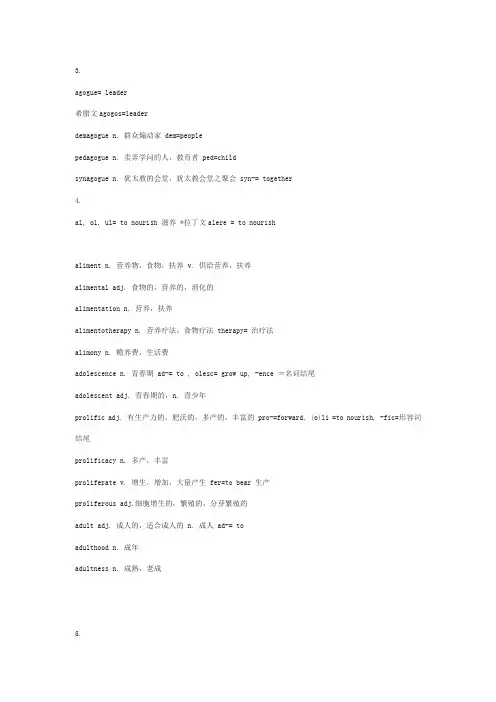
3.agogue= leader希腊文agogos=leaderdemagogue n. 群众煽动家 dem=peoplepedagogue n. 卖弄学问的人,教育者 ped=childsynagogue n. 犹太教的会堂,犹太教会堂之聚会 syn-= together4.al, ol, ul= to nourish 滋养 *拉丁文alere = to nourishaliment n. 营养物,食物,扶养 v. 供给营养,扶养alimental adj. 食物的,营养的,消化的alimentation n. 营养,扶养alimentotherapy n. 营养疗法,食物疗法 therapy= 治疗法alimony n. 赡养费,生活费adolescence n. 青春期 ad-= to , olesc= grow up, -ence =名词结尾adolescent adj. 青春期的,n. 青少年prolific adj. 有生产力的,肥沃的,多产的,丰富的 pro-=forward, (o)li =to nourish, -fic=形容词结尾prolificacy n. 多产,丰富proliferate v. 增生,增加,大量产生 fer=to bear 生产proliferous adj.细胞增生的,繁殖的,分芽繁殖的adult adj. 成人的,适合成人的 n. 成人 ad-= toadulthood n. 成年adultness n. 成熟,老成5.alt=high 拉丁文altus=highaltar n. 祭坛(高的地方)altimeter n. 高度计 meter =计量器altitude n. 高度,海拔-itude 抽象名词结尾exalt v.提高,擢升,使得意,赞扬 ex-=out, upexaltation n. (等级、荣誉等)提高,狂喜haughty adj. 傲慢的,骄傲的 haughty=alt =high6.alter, ali=other 拉丁文alter=otheralter v. 改变,更改alteration n. 变更,更改altercate v. 口角,争论altercation n. 口角,争论alternate adj. 轮流的,n. 交替,轮流,代理人 v. 轮流,交替alternation v. 交互,交替alternative adj. 二者择一的,n. 二者择一,选择余地alternator n. 交流发电机altruism n. 利他主义 altru= alter =other , -ism =表主义的名词词尾altruistic adj. 利他主义的alien adj. 外国人的,相反的,n.. 外国人alienable adj. 可让渡的alienate v. 使疏远,让渡alienation n. 疏远,让渡alias n. 别名,化名,假名 / 拉丁文alius=otheralibi n. 不在场的证明,托辞,藉口 bi = placeadulterate v. 掺混 adj. 不道德的,堕落的 ad-=to , ulter= alter adultery n. 通奸,私通7.am = to love 拉丁文amare = to loveamateur n. 业余技艺家,业余者amatory adj. 恋爱的,色情的amiable adj. 和蔼可亲的amicable adj. 友善的,和平的amity n. 友好,和睦amorist n. 情人,爱情小说家amorous adj. 多情的,表示爱情的enamour v. 引起爱怜,迷信 en-= in , em =am = to loveenmity n. 敌意,不和,敌对8.ang = to strangle 勒死,窒息拉丁文angere= to strangleanger v. 激怒,n. 愤怒angry adj. 愤怒的,生气的anguish n. 身心极大的痛苦anxiety n. 忧虑,渴望anxious adj. 忧虑的,渴望的9.angl, angul = angle 角拉丁文angulus= angleangle n. 角,角度,观点,方面,角落 v. 歪曲,作不实的新闻报导angular adj. 有角的,消瘦的,笨拙的equiangular adj. 等角的 equi=equalquadrangular adj. 四边形的 quadr-=fourrectangle n. 长方形,矩形 rect=righttriangle n. 三角形,tri-=threetriangular adj. 三角形的,三者间的10.anim=breath 气息, mind心animal n. 动物,adj. 动物界的,野兽的animalcule n. 微生动物-cule =表示小的名词结尾animalism n. 兽性,兽性主义,精力 ism 表示主义,性质animality n. 兽性,动物性,动物界animate adj. 有生命的,活的 v. 使活泼,使有生气animation n. 兴奋,活泼animator n. 鼓舞者,卡通片绘制者animosity n. 怨恨,憎恶(深映在心头上的一种感觉)animus n. 恶意,敌意=animositydisanimate v. 使失去生命,使失去生气,使灰心 dis-= to deprive of equanimity n. 平静,镇定(心里平衡) equ= equal , anim=mind, ity=n. inanimate adj. 无生命的,无生气的(in=not )magnanimity n. 宽大,雅量(心地宽阔) magn=greatmagnanimous adj. 心地高尚的,度量宽大的reanimate v. 使复活,使恢复生气,激励 re-=againunanimous adj. 意见一致的11.ann =year 年拉丁文annus =yearannals n. 年鉴,历史记载anniversary n. 周年,周年记念(一年巡回一次)vers =to turnAnno Domini = in the year of our Lord 耶稣纪元后,公元拉丁文dominus =lord annual adj. 一年一次的,n. 一年生植物,年报,年鉴annuity n. 年金,养老金biannual adj. 一年两次的,bi= twobiennial adj. 两年一次的,n. 二年生植物centennial adj. 百年一次的,百年记念的 n. 百年纪念 cent= hundredperennial adj. 四季不断的,永久的 n. 多年生植物 per =throughsuperannuate v. 认为年老/病弱而使退休,给予退休金而使退休,勒令退学 super-=above 12.anthrop=man希腊文anthrops=mananthropocentric adj. 认定人为宇宙中心的 centr= centeranthropography n. 人类志 graphy = writinganthropoid adj. 似人类的 -oid=希腊文 eidos = formanthropology n. 人类学 logy=studyanthropomorphism n. 神人同形论,与人同形希腊文morphe =form anthropomorphous adj. 有人形的,神人同形或同性论的misanthrope n. 厌世者 mis-=希腊文 misein = to hatemisanthropy n. 对人类之厌恶philanthrope n. 慈善家=philanthropist , phil= to lovephilanthropy n. 博爱,慈善心13.apt =fit拉丁文aptus=fitapt adj. 倾向于,适合于aptitude n. 癖性,才能,适当 -itude 抽象名词字尾aptness n. 适合性,倾向,才能adapt v. 使适合,改编 ad-=toadaptable adj. 能适应的,可改编的adaptation n. 适应,改编,改编的作品adaptive adj. 适应的inapt adj. 不适宜的,笨拙的,in-=notinaptitude n. 不适宜,笨拙14.aqua=water拉丁文aqua=wateraquafortis n. 硝酸,硝酸水=nitric acidaquamarine n. 水宝蓝色,蓝绿色 , marine = seaaquatic adj. 水生的,水的;n. 水生植物或动物,水上运动aqueduct n. 水道,沟渠,导水管 duct = to leadaquifer n. 含水土层 fer= to carry15.arm =weapons拉丁文 arme =weapons ; armare= to armarms n. 武器,军械,纹章 v. 武装armada n. 舰队,西班牙文armada=fleetarmament n. 军备armed adj. 武装的,有~装备的armistice n. 休战,(让相对的武器竖立起来), st=to stand armour n. 甲胃,铁甲,v. 装甲armoury n. 军械库,军械制造厂,纹章学army n. 军队,陆军,群众alarm n. 惊慌,警报,警铃 v. 使惊慌,警告disarm v. 解除武装,驱除敌意或怀疑disarmament n. 解除武装,裁剪军备16.art =skill技巧, art技术art n. 技术,技巧,人文科学,诡计artful adj. 狡诈,巧妙的,人为的,不自然的artist n. 画家,艺术家,工艺名家artistic adj. 艺术的,艺术家的,艺术性的artless adj. 无技巧的,笨拙的,自然的,天真烂漫的artifact n. 人工制品,加工品,工艺品, fact=to make, to do artificial adj. 人造的,不自然的,做作的,fic= to make artisan n. 工匠,技工 san=saint17.aud = to hear拉丁文audire= to hearaudible adj. 可听见的audience n. 听众,观众,正式谒见,会见 -ence =名词字尾audiometer n. 音波计,听力计audio-visual adj. 视听的 vis= to seeaudiphone n. 助听器 phone=soundaudition n. 听力,听觉,试听,v.( 作)试听auditor n. 旁听者,查账员auditorial adj. 听觉的,查账员的auditorium n. 听众席,礼堂; -um 表示地点的名词字尾auditory adj. 听觉的,n. 听众(席)obedient adj. 顺从的,ob-在此无特殊意义+ edi=hear + ent形容词字尾obey v. 服从,遵守disobedient adj. 不顺从的,dis- =not18.aug=to increase 增加,to make grow 使产生,使增大拉丁文augere= to increase, to make grow, 过去分词是auctus auction n. 拍卖,v. 拍卖(渐渐地增加其价值)auctioneer n. 拍卖人,v. 拍卖audacity n. 大胆无畏的精神,胆识,厚颜无耻augment v. 增大augmentative adj. 增加的,伟大的august adj. 威严的(一直增加到伟大的程度)author n. 创始者,著作者(使食物产生的人)authority n. 权威,权势,当局,根据(食物产生的根据)authoritative adj. 有权势的authorize v. 授权,使合法authentic adj. 可信的,有根据的,真正的(作者亲笔所写的)authenticity n. 真实性,确切性19.avi=bird拉丁文avis=birdavian adj. 鸟类的aviarist n. 飞禽饲养家aviary n. 大鸟笼,鸟舍 -ry 表示地点的名词字尾aviate v. 飞行,航行(像鸟一样的)aviation n. 飞行,航行aviator n.. 飞机驾驶员aviatrix n. 女飞行员,trix-=feminine 女性avicide n. 杀害鸟类 cid-=to cutaviculture n. 鸟类饲养,avi(bird)+cult(to till 耕种)+-ure(名词字尾)auspice n. 前兆(以鸟的飞行来预卜吉凶) au(avi=bird )+spice(拉丁文specere=to see)auspicious adj. 幸运的,吉兆的inauspicious adj. 不幸的,凶兆的augur n. (古罗马)占兆官,v. 占兆,预言augural adj. 占兆的,预言的augury n. 占兆,征兆inaugurate v. 举行就职典礼,创始(用卜卦算出吉辰);in-=ininauguration n. 就职(典礼),创始20.band , bond= to bind 捆绑樊文bhand=to bindband n. 皮带,带子,条纹,乐队,v. 联合,以带结之(用来绑缚的东西)bandage n. 绷带,v. 缚以绷带bond n. 束缚,债券,契约,保证人v. 抵押,结合,作保bond n. 同盟,联盟,(团结在一起)bondage n. 奴隶的身份,束缚,囚禁(被束缚住的身份)contraband n. 非法买卖,走私货,违禁品(反抗束缚);contra-=againstbound adj. 装订好的,必定,决心的,被束缚的,驶(飞,开)往~的,v. 反弹,限制,n. 范围,界限boundary n. 界线,边界21.bar=bar 横木拉丁文barra =barbar n. 棒,栅,障碍,律师业,法院,酒馆,v. 用闩关住,饰以条纹 prep. 除~之外barrage n. 掩护炮火,弹幕,多如弹雨之物,v. 布下弹幕以对抗barrel n. 大桶,枪身,v. 装入桶中,(以木棒为材料做成的)barricade n. 临时建筑的防御工事,阻挡通路的障碍物,v.设栅防守,阻碍(以棒子来防御)barrier n. 障碍,界线,v.用栅栏围起来(用栅栏防御)barring prep. 除~之外barrister n. 律师debar v. 阻止,禁止,排除,de-=intensive 加强语气embargo v. 禁运,禁止通商,禁止,限制 em-= en-=inembarrass v. 使困窘,妨碍,使复杂(将棒子放入其中)embarrassment n. 困窘embarrassing adj. 令人困窘的22.bat=to beat 打拉丁文 batter= to beatbat n. 棒,v. 用棒击baton n. 警棍,指挥棒,权杖,司令杖battalion n. 军队,大队,营,(加入战斗的队伍)batter v. 连击,敲碎,n. 打击者(-er 表示反复的词尾)battered adj. 打扁了的,憔悴的battery n. 电池,列炮,炮兵连,殴打battle n. 战斗,战争,胜利,v. 作战(对打)battlement n. 城垛,城墙堞口(打的地方)abate v. 减少,减弱,降低,使缓和,(减少打击),a-=offcombat v. 格斗,战斗 n. 战斗,争斗(一同对打);com-=togethercombative adj. 好斗的debate v. 讨论,n. 讨论,辩论(将对方打倒)23.bat , bas= to go 走希腊文bainein= to goacrobat n. 杂技演员 acro=highacrobatic adj. 杂技的acrobatics n. 杂技,熟练的技巧aerobatic adj. 飞行技巧的(aero=in the air)aerobatics n. 高级飞行术,特技飞行abasia n. (痉挛性)不能步行症; a-(not)+bas(to go)+-ia(condition)basophobia n. 步行恐怖(惧怕走动或起立的心理症);bas(o)(to go)+phob(to fear)+-ia(condition) 24.bell=war 战争拉丁文bellum =warantebellum adj. 战前的,(特指)美国南北战争之前的;ante-(before)+bell(war )+-um (形容词字尾) bellicose adj. 好战的,好争吵的;-cose 形容词字尾belligerent adj. 好战的,好争吵的,交战中的,ger-=to carryrebel n. 叛徒,adj. 反叛的,v. 反叛(又引起战争);re-=againrebellion n. 反叛,反抗rebellious adj. 反叛的,难治的,难处理的rebeldom n. 反叛者,暴动地区,叛变;-dom=state。

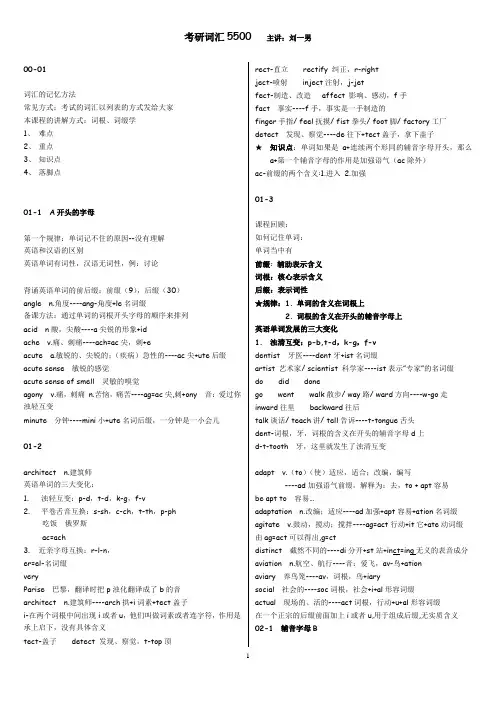
考研词汇5500 主讲:刘一男00-01词汇的记忆方法常见方式:考试的词汇以列表的方式发给大家本课程的讲解方式:词根、词缀学1、难点2、重点3、知识点4、落脚点01-1 A开头的字母第一个规律:单词记不住的原因--没有理解英语和汉语的区别英语单词有词性,汉语无词性,例:讨论背诵英语单词的前后缀:前缀(9),后缀(30)angle n.角度----ang-角度+le名词缀备课方法:通过单词的词根开头字母的顺序来排列acid n酸,尖酸----a尖锐的形象+idache v.痛、刺痛----ach=ac尖,刺+eacute a.敏锐的、尖锐的;(疾病)急性的----ac尖+ute后缀acute sense 敏锐的感觉acute sense of smell 灵敏的嗅觉agony v.痛,刺痛n.苦恼,痛苦----ag=ac尖,刺+ony 音:爱过你浊轻互变minute 分钟----mini小+ute名词后缀,一分钟是一小会儿01-2architect n.建筑师英语单词的三大变化:1. 浊轻互变:p-d,t-d,k-g,f-v2. 平卷舌音互换:s-sh,c-ch,t-th,p-ph吃饭俄罗斯ac=ach3.近亲字母互换:r-l-n,er=el-名词缀veryParise 巴黎,翻译时把p浊化翻译成了b的音architect n.建筑师----arch拱+i词素+tect盖子i-在两个词根中间出现i或者u,他们叫做词素或者连字符,作用是承上启下,没有具体含义tect-盖子detect 发现、察觉,t-top顶rect-直立rectify 纠正,r-rightject-喷射inject注射,j-jetfect-制造、改造affect 影响、感动,f手fact 事实----f手,事实是一手制造的finger手指/ feel抚摸/ fist拳头/ foot脚/ factory工厂detect 发现、察觉----de往下+tect盖子,拿下盖子★知识点:单词如果是a+连续两个形同的辅音字母开头,那么a+第一个辅音字母的作用是加强语气(ac除外)ac-前缀的两个含义:1.进入2.加强01-3课程回顾:如何记住单词:单词当中有前缀: 辅助表示含义词根:核心表示含义后缀:表示词性★规律:1. 单词的含义在词根上2. 词根的含义在开头的辅音字母上英语单词发展的三大变化1.浊清互变:p-b,t-d,k-g,f-vdentist 牙医----dent牙+ist名词缀artist 艺术家/ scientist 科学家----ist表示‖专家‖的名词缀do did donego went walk散步/ way路/ ward方向----w-go走inward往里backward往后talk谈话/ teach讲/ tell告诉----t-tongue舌头dent-词根,牙,词根的含义在开头的辅音字母d上d-t-tooth 牙,这里就发生了浊清互变adapt v.(to)(使)适应,适合;改编,编写----ad加强语气前缀,解释为:去,to + apt容易be apt to 容易…adaptation n.改编;适应----ad加强+apt容易+ation名词缀agitate v.鼓动,搅动;搅拌----ag=act行动+it它+ate动词缀由ag=act可以得出,g=ctdistinct 截然不同的----di分开+st站+inct=ing无义的表音成分aviation n.航空、航行----音:爱飞,av-鸟+ationaviary 养鸟笼----av,词根,鸟+iarysocial 社会的----soc词根,社会+i+al形容词缀actual 现场的、活的----act词根,行动+u+al形容词缀在一个正宗的后缀前面加上i或者u,用于组成后缀,无实质含义02-1 辅音字母B1blackboard 黑板----black黑色+board板子→b板子,棒子bl-和颜色相关blue蓝色/ blush红色/ blood血/ blond金色/ blank空白的黄、红、黑、褐、灰→h,中文颜色和h相关粉f,此处发生近亲辅音字母h和f的互换英语单词中,相近的含义用相同的辅音字母开头board 板子----b板子、棒子+oard单音节词汇的含义在它开头的辅音字母上bar柜台/ boat船/ bed床/ bone骨头/ bench板凳aboard ad.在船(飞机、车)上,上船(车、飞机)prep.在(船、飞机、车)上,上(船、飞机、车)----a-at在+board板子,即在板子上abundance n.丰富,充裕---- a无+bound边界+ance名词缀abound v.丰富,充裕英语单词的名词和形容词是由同源动词派生出来的动词+-ant=形容词动词+-ance=名词abound v.丰富、充裕----a无+bound边界booud 边界---b板子,边界的含义来自于板子,界碑board+er=border 边缘abundant a.(in)丰富的,充分的,充裕的★知识点:a有否定前缀和加强语气两大功能beam n.(横)梁,桁条;(光线的)束,柱----b-板子,棒子+eam stream 小溪----str-表达一个和小溪相关的核心含义,-eam无义string琴弦/ street大街/ stripe 条纹/ strap皮带→str-与狭长、细长有关str-,英语单词中以str开头的词,如果是名词的话,含义总是与狭长、细长有关;动词则与拉紧、扯紧有关★结论:多音节词汇,去掉前缀和后缀,找到词根的含义单音节词汇,在单词第一次出现元音字母的地方分开,有几个辅音字母就把它划分出来abolish v.废除,取消----a否定前缀+bol=born生+ish动词缀bol-bom-bor 生finish v.完成----ish动词词缀final a.最终的----al形容词缀vanish 消失----van-went走+ish形容词缀van词根,表示走的概念v-w走pan盘子/ fan扇子/ clan家族/ scan扫描scan 扫描----sc看+anscout 侦察机、侦查员----sc表示看+out出去,看出去.到外面看clan 家族class班级/ club俱乐部/ clap 鼓掌/ close关门/ cloud云cl-与集合相关fan 扇子----f与手相关pan 盘子----p与手掌和类似于手掌的含义和形象相关例: plam手掌/ piece一张/ peace和平/ paper纸近亲字母:r/l/n v/wvan=wentborn~bor~bol生fic fect 做bene 好benign a.(病)良性的,(气候)良好的,仁慈的,和蔼的abolish v.废除,取消02-2如何寻找单词的含义:单词分为:1.多音节词汇,含义在词根上。
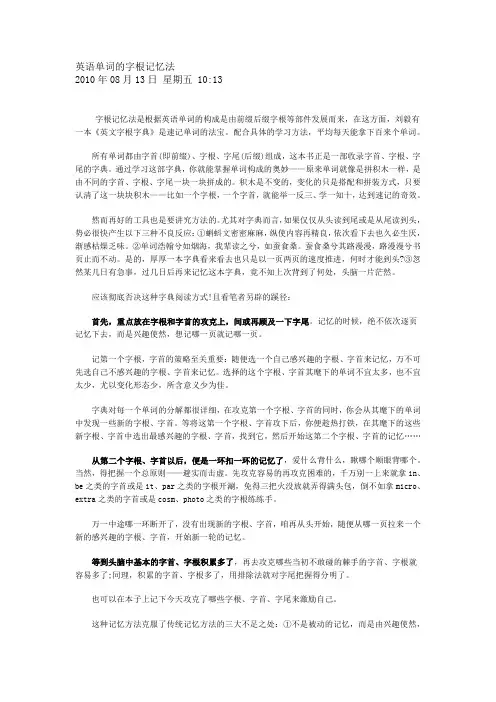
英语单词的字根记忆法2010年08月13日星期五 10:13字根记忆法是根据英语单词的构成是由前缀后缀字根等部件发展而来,在这方面,刘毅有一本《英文字根字典》是速记单词的法宝。
配合具体的学习方法,平均每天能拿下百来个单词。
所有单词都由字首(即前缀)、字根、字尾(后缀)组成,这本书正是一部收录字首、字根、字尾的字典。
通过学习这部字典,你就能掌握单词构成的奥妙——原来单词就像是拼积木一样,是由不同的字首、字根、字尾一块一块拼成的。
积木是不变的,变化的只是搭配和拼装方式,只要认清了这一块块积木——比如一个字根,一个字首,就能举一反三、学一知十,达到速记的奇效。
然而再好的工具也是要讲究方法的。
尤其对字典而言,如果仅仅从头读到尾或是从尾读到头,势必很快产生以下三种不良反应:①蝌蚪文密密麻麻,纵使内容再精良,依次看下去也久必生厌,渐感枯燥乏味。
②单词浩翰兮如烟海,我辈读之兮,如蚕食桑。
蚕食桑兮其路漫漫,路漫漫兮书页止而不动。
是的,厚厚一本字典看来看去也只是以一页两页的速度推进,何时才能到头?③忽然某几日有急事,过几日后再来记忆这本字典,竟不知上次背到了何处,头脑一片茫然。
应该彻底否决这种字典阅读方式!且看笔者另辟的蹊径:首先,重点放在字根和字首的攻克上,间或再顾及一下字尾。
记忆的时候,绝不依次逐页记忆下去,而是兴趣使然,想记哪一页就记哪一页。
记第一个字根,字首的策略至关重要:随便选一个自己感兴趣的字根、字首来记忆,万不可先选自己不感兴趣的字根、字首来记忆。
选择的这个字根、字首其麾下的单词不宜太多,也不宜太少,尤以变化形态少,所含意义少为佳。
字典对每一个单词的分解都很详细,在攻克第一个字根、字首的同时,你会从其麾下的单词中发现一些新的字根、字首。
等将这第一个字根、字首攻下后,你便趁热打铁,在其麾下的这些新字根、字首中选出最感兴趣的字根、字首,找到它,然后开始这第二个字根、字首的记忆……从第二个字根、字首以后,便是一环扣一环的记忆了,爱什么背什么,瞅哪个顺眼背哪个。
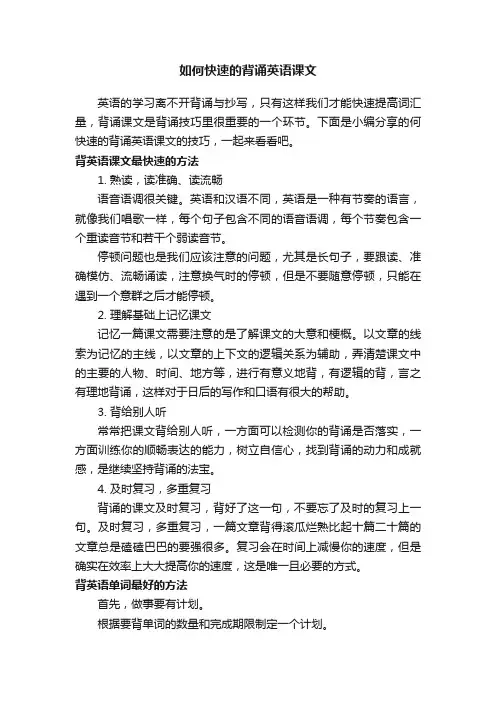
如何快速的背诵英语课文英语的学习离不开背诵与抄写,只有这样我们才能快速提高词汇量,背诵课文是背诵技巧里很重要的一个环节。
下面是小编分享的何快速的背诵英语课文的技巧,一起来看看吧。
背英语课文最快速的方法1. 熟读,读准确、读流畅语音语调很关键。
英语和汉语不同,英语是一种有节奏的语言,就像我们唱歌一样,每个句子包含不同的语音语调,每个节奏包含一个重读音节和若干个弱读音节。
停顿问题也是我们应该注意的问题,尤其是长句子,要跟读、准确模仿、流畅诵读,注意换气时的停顿,但是不要随意停顿,只能在遇到一个意群之后才能停顿。
2. 理解基础上记忆课文记忆一篇课文需要注意的是了解课文的大意和梗概。
以文章的线索为记忆的主线,以文章的上下文的逻辑关系为辅助,弄清楚课文中的主要的人物、时间、地方等,进行有意义地背,有逻辑的背,言之有理地背诵,这样对于日后的写作和口语有很大的帮助。
3. 背给别人听常常把课文背给别人听,一方面可以检测你的背诵是否落实,一方面训练你的顺畅表达的能力,树立自信心,找到背诵的动力和成就感,是继续坚持背诵的法宝。
4. 及时复习,多重复习背诵的课文及时复习,背好了这一句,不要忘了及时的复习上一句。
及时复习,多重复习,一篇文章背得滚瓜烂熟比起十篇二十篇的文章总是磕磕巴巴的要强很多。
复习会在时间上减慢你的速度,但是确实在效率上大大提高你的速度,这是唯一且必要的方式。
背英语单词最好的方法首先,做事要有计划。
根据要背单词的数量和完成期限制定一个计划。
可以每天背100个或者50个(参照个人能力或前几天所记忆单词的成果,以下我就以每天50个为例)定了计划就要一步步执行。
第一天先记忆50个单词(一般来说上午9点~11点、下午3点~4点、晚上7点~10点为最佳记忆时间)并且把这天所记单词记录在草稿纸上(不要标注汉语意思)每天坚持做这件事。
第二天,先把第一天记录的单词复习一遍,如果有忘了的就写下来(同样不要标注汉语意思),待复完后把忘记的单词重新记忆一次。
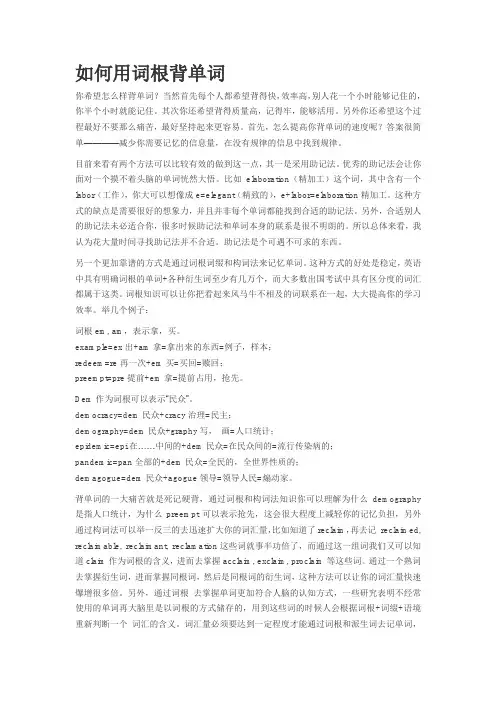
如何用词根背单词你希望怎么样背单词?当然首先每个人都希望背得快,效率高,别人花一个小时能够记住的,你半个小时就能记住。
其次你还希望背得质量高,记得牢,能够活用。
另外你还希望这个过程最好不要那么痛苦,最好坚持起来更容易。
首先,怎么提高你背单词的速度呢?答案很简单————减少你需要记忆的信息量,在没有规律的信息中找到规律。
目前来看有两个方法可以比较有效的做到这一点,其一是采用助记法。
优秀的助记法会让你面对一个摸不着头脑的单词恍然大悟。
比如elaboration(精加工)这个词,其中含有一个labor(工作),你大可以想像成e=elegant(精致的),e+labor=elaboration精加工。
这种方式的缺点是需要很好的想象力,并且并非每个单词都能找到合适的助记法。
另外,合适别人的助记法未必适合你,很多时候助记法和单词本身的联系是很不明朗的。
所以总体来看,我认为花大量时间寻找助记法并不合适。
助记法是个可遇不可求的东西。
另一个更加靠谱的方式是通过词根词缀和构词法来记忆单词。
这种方式的好处是稳定,英语中具有明确词根的单词+各种衍生词至少有几万个,而大多数出国考试中具有区分度的词汇都属于这类。
词根知识可以让你把看起来风马牛不相及的词联系在一起,大大提高你的学习效率。
举几个例子:词根em, am,表示拿,买。
example=ex出+am拿=拿出来的东西=例子,样本;redeem=re再一次+em买=买回=赎回;preempt=pre提前+em拿=提前占用,抢先。
Dem作为词根可以表示“民众”。
democracy=dem民众+cracy治理=民主;demography=dem民众+graphy写,画=人口统计;epidemic=epi在……中间的+dem民众=在民众间的=流行传染病的;pandemic=pan全部的+dem民众=全民的,全世界性质的;demagogue=dem民众+agogue领导=领导人民=煽动家。
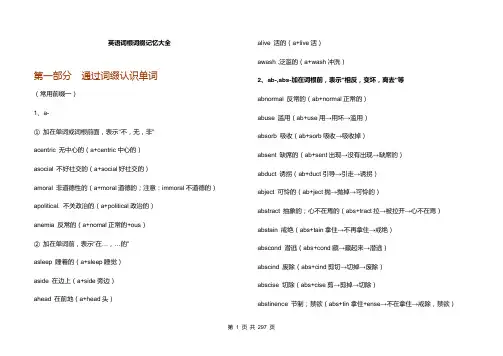
英语词根词缀记忆大全第一部分通过词缀认识单词(常用前缀一)1、a-①加在单词或词根前面,表示"不,无,非"acentric 无中心的(a+centric中心的)asocial 不好社交的(a+social好社交的)amoral 非道德性的(a+moral道德的;注意:immoral不道德的)apolitical. 不关政治的(a+political政治的)anemia 反常的(a+nomal正常的+ous)②加在单词前,表示"在…,…的"asleep 睡着的(a+sleep睡觉)aside 在边上(a+side旁边)ahead 在前地(a+head头)alive 活的(a+live活)awash .泛滥的(a+wash冲洗)2、ab-,abs-加在词根前,表示"相反,变坏,离去"等abnormal 反常的(ab+normal正常的)abuse 滥用(ab+use用→用坏→滥用)absorb 吸收(ab+sorb吸收→吸收掉)absent 缺席的(ab+sent出现→没有出现→缺席的)abduct 诱拐(ab+duct引导→引走→诱拐)abject 可怜的(ab+ject抛→抛掉→可怜的)abstract 抽象的;心不在焉的(abs+tract拉→被拉开→心不在焉)abstain 戒绝(abs+tain拿住→不再拿住→戒绝)abscond 潜逃(abs+cond藏→藏起来→潜逃)abscind 废除(abs+cind剪切→切掉→废除)abscise 切除(abs+cise剪→剪掉→切除)abstinence 节制;禁欲(abs+tin拿住+ense→不在拿住→戒除,禁欲)3、ab-,ac-,ad-,af-,ag-,an-,ap-,ar-,as-,at-等加在同辅音字母的词根前,表示"一再"等加强意accelerate陪伴(ac+company伙伴→陪伴)accentuate加速(ac+celer速度→一再增加速度)accomplish强制(ac+cent唱歌→一再唱出→强调)accumulate积累(ac+cumul堆积+ate→堆积起来→积累)accustom使习惯(ac+custom习俗→习惯习俗)addict上瘾,入迷(ad+dict说→一再说起→对……入迷)additive上瘾的(addict的形容词)adduce引证,举例(ad+duce引导→一再引导→举例说明)affable亲切的(af+fable说话→不断可以说话→亲切)afford买得起(af+ford拿出→一再拿出{钱}→买得起)affirm肯定(af+firm坚定→肯定)aggression侵略,进攻(ag+gress走+ion→一再往前走→进攻)aggrandize扩大(ag+grand大→一再大→扩大[权力]等)aggravate恶化(ag+grav重+ate病加重)announce通告(an+nounce通知→通告)appal使震惊(ap+pal白色→[脸]变白→受惊)applause鼓掌(ap+pease赞扬→一再赞扬→鼓掌)appreciate欣赏(ap+reci价值+ate→一再给价→欣赏)appoint指定,任命(ap+point指→指定)arrange安排(ar+range排列→安排)arrest逮捕,阻止(ar+rest休息→不让动→逮捕)arrive到达(ar+rive河→到达河边→达到目标)assault进攻(as+saul跳→跳起来→进攻)assiduous勤奋的(as+sid坐+uous→一再坐着[学习] →勤奋)assist帮助(as+sist站→站过来→帮助)associate联合,结合(as+soci社团+ate→结成团队→联合)assimilate吸收;同化(as+simil相同+ate→成为相同→同化)assure肯定;确信(as+sure确定→一不再确定→肯定)attach附上;依恋(at+tach接角→接触上→附上)attain达到;获得(at+tain拿住→获得)attend(at+tend关心→关心到了→出度)attract吸引(拉→拉过来→吸引)attest证实(at+test试验→一再试验→证实)4、ad-加在在单词或词根前,表示"做…,加强…"adapt适应(ad+apt能力→有适应能力)adept熟练的(ad+ept能力→有做事能力→熟练的)adopt收养;采纳(ad+opt选择→选出来→采纳)adhere坚持(ad+here粘→粘在一起→坚持)adjacent邻近的(ad+jacent躺→躺在一起→邻近的)adjoin贴近;毗连(ad+join参加→参加在一起→贴近)administrate管理;执行(ad+ministr部长+ate→做部长→管理)admire羡慕(ad+mire惊奇→惊喜;羡慕)adumbrate预示(ad+umbr影子+ate→[将来的]影子出现→预示)adjust调整(ad+just+正确→弄正确→调整)adventure冒险(ad+venture冒险)admonish告诫,警告(ad+mon警告+ish→一再警告)advent来临,来到(ad+vent来→来到)5、amphi-表示"两个,两种"amphibian两栖动物(amphi+bi生命+an→两个生命→两栖动物)amphicar水陆两用车(amphi+car车→两用车)6、an-在词根前,表示"不,无"anarchism无政府主义(an+arch统治+ism→无统治→无政府主义)anharmonic不和谐的(an+hamonic和谐的→不和谐的)anechoic无回声的(an+echo回声+ic→无回声的)anonymous匿名的(an+onym名字+ous→匿名的)7、ana-表示"错误,在旁边,分开"analogy类比;类似(ana+logy讲话→再旁边讲→讲一样的东西→类似) analogous类似的(analogy的形容词)analysis分析(ana+lysis分开→分开来→分析)8、ante-表示"前面,先"antedate提前写日期;先于,早于(ante+date日期→提前写日期)anterior前面的(ante+erior[…的] →前面的)antecedent(aute+ced走+ent→走在前面的[事] →前事)9、anti-表示"反对,相反"antiwar反战的(anti+war战争)antipathy反感(anti+pathy感情)antithesis对立;反论(anti+thesis论文;观点)antibacterial 抗菌的(anti+bacterial细菌的)antibody抗体(anti+body身体)10、人,人类-anthrop(o)anthropology[anthropo人类,-logy…学者]人类学anthropologist[anthropo人类,-logist…学者]人类学者anthropogeography[anthropo人类,gegoraphy地理学]人类地理学anthropomorphous[anthropo人,morph形,-ous…的]有人形的,似人的anthroposociology [anthropo人类,sociology社会学]人类社会学11、人民―(1)populpopulation[popul人民→居民,-ation名词字尾]全体居民,人口populous [popul人民→居民,-ous…的]人口稠密的populate [popul人民,-ate动词字尾,使…,做…]使人民居住于…中,使人口集中在…之中,移民于….Repopulate [re-再,重新,见上]使人民重新居住于…Depopulate [de-除去,去掉,popul人民→人口,-ate使…]使(某地)人口减少,减少人口Popularity[见上,-ity名词字尾,表示性质]大众性,通俗性Popularize[见上,- ize…化,使…](使)大众化,(使)普及,推广Popularizer[见上,-er者]普及者,推广者Popularization[见上,-ation表示行为]普及,推广,通俗化Populace[popul人民→平民,-ace名词字尾]平民,大众人民-(2)dem(o)democracy[demo人民,cracy统治;"人民统治"→人民做主→]民主;民主政治,民主政体;民主主义democrat[见上,crat主张…统治的人]民主主义者democratism[见上,-ism主义]民主主义democratize[见上,-ize…化]民主化;使民主化democratic[见上,-ic…的]民主的,民主主义的;民主政体的demography[demo人民→人数,人口,graphy写,记录→统计]人口统计学demographic[见上,-ic…的]人口统计的epidemic[epi-在…之间,dem人民,-ic…的;"流行于人民之中的" →]流行的,传染的;流行病,时疫epidemiology[见上,- io-连接字母,-logy…学]流行病学epidemiologist[见上,-logist…学者]流行病学者epidemiological[见上,-logical…学的]流行病学的男-(1)andr(o) androgyne[andro男人,gyn女人]具有男妇两性的人,阴阳人androgynism[andro男,gyn女,-ism表性质状态]半男半女男-(2)virvirile[vir男,ile形容词字尾,…的]男的,男性的,男子的,有男子气概的,有男性生殖力的virilism[见上,-ism表示现象]男性现象virility[见上,-ity表示性质]男子气概,男生殖力,男子的成年女-(1)gyn(o); gynec(o)gynecology[gyneco妇女,-logy…学]妇科学,妇科gynecologist[见上,-ist人]妇科医生gynecian[gynec妇女,-ian…的]妇女的,妇人的女-(2)fem; feminfemale[fem女,妇女]女性的,妇女的;女子feminine[femin女,-ine…的]女性的,妇女的femininity[femin女,-ality表示性质]女性,妇女的特性femininity[feminine(e)女性的,-ity表示性质]女子的气质,女人气,妇女总称feminism[femin女,-ism主义]男女平等主义;[-ism表示行为]争取女权运动femme妇女;妻子12、be-①构成动词,表示"使…成为"beguile欺骗(be+guile欺骗)belie掩盖(be+lie说慌)bequeath遗留给,传下(be+queath要求→要求给某人→遗留给)besiege围攻(be+siege包围→包围起来)beware注意(be+ware注意)befriend友好对待(be+friend朋友)befool欺骗(be+fool笨蛋→使人成笨蛋→欺骗别人)befall降临;发生(be+fall掉下→掉下来→发生)belittle小看(be+little小→小看人)bewilder使…迷惑(be+wilder迷惑)②构成一些介词before在前面(be+fore前面)beneath在下面(be+neath下面)13、bene- 表示"善,好"benewolent好意的(bene+vol意愿+ent→好意的)benefaction好事;恩惠(bene+fact做+ion→好事)benefit好处,利益(bene+fit做→做事后的好处→利益)benediction祝福(bene+dict说+ion→说好话)beneficent仁慈的,善行的(bene+fic做+ent→做好事的)14、bi-表示"两个,两"biweekly双周刊(bi+week星期+ly→两星期)bilingual双语种的(bi+lingu语言+al→双语的)biennial两年一次的(bi+enn年+ial→两年〔一次〕的)biannual一年两次的(bi+ann[年]+ual→一年两次的)15、by-表示"在旁边,副的"byproduct副产品(by+product产品)byroad辅路(by+road路)byway小道(by+way小路)bygone过时的(by+gone过去的)bypass旁路;忽略(by+pass通过→从旁边通过→忽略)by work副业(by+work工作)16、circum-表示"环绕,周围"circumcise环割(circum+cise切→环切)circumference周长(circum+fer带来→ence→带来一圈→周长)circumnavigate环航世界(circum+navigate航行)circumscribe限制(circum+scribe写→规定范围→限制)circumspect小心谨慎的(circum+stance站→站在周围→环境)circumvent回避(circum+vent走→绕圈走→回避)17、co-表示"共同",通常放在元音词根前Cooperation合作(co+operation操作→共同操作→合作) Coagulate凝结(co+agul凝聚+ate→凝聚起来)Coalesce联合;合作(co+al=ally联盟+esce)Coexist共存(co+exist存在)Cohere附着;粘着(co+here粘→粘在一起)Coincide一致,符合,巧合(co+in进+cide掉下→共同掉进来→巧合) Coordinate协调:同等的(co+ordin顺序+ate→顺序一样→同等的引申为平等;协调)18、col-,cor在同辅音词根前,表示"共同"collaboration协作;合著(col+labor劳动+ation→共同劳动)collocate并置,排列(col+loc地方+ate→放在同一地方→排列)co lingual用同一种语言的(col+lingu语言+al→同语言的)collapse倒塌(col+lapse滑倒→全部滑倒→倒塌)collate校对(col+late放→放到一起→校对)collateral并列的,并行的(col+later边→al→周边的→并列的)colleague同事(col+→l eague捆绑→捆绑在一起的人→同事)collect收集(col+lect选择→放在一起选择→收集)collegiate学院的;学生的(col+legi读+ate→共同读书→学院的)colloquial口语的(col+loqu说+ial→两人一起说→口语会话的)collusion共谋,勾结(col+lus玩+ion→共同玩弄→共谋)correct改正,纠正(cor+rect正→全部改正→纠正)correspond通信;符合(cor+respond反应→共同反应→相互通信)corrupt腐败的;变环的(cor+rupt断→全部断→变坏的,腐败的)corrigible能够改正的(cor+rig改正+ible→全部改正的)corroborate证实(cor+robor力量+ate→用力量→证实)19、com-,con-表示"共同"combine联合,结合(com+bine捆→捆在一起→结合)compassion同情(com+passion爱国者→同胞)compatriot同胞(com+patriot动→大家一起动→动乱)commend赞扬;推荐(com+mend信任;命令→大家信任→赞扬;参考;recommend) commemorate纪念(com+memor记住+ate→大家一起记住→纪念) commensurable相等的,相称的(com+mensur测量+able→能放在一起的测量→相等的)comparison比较(com+pari平等+son→一起平等→比较)compact紧密的;合同(com+pact压紧→全部压紧→紧密的)comfort安慰(com+fort加强→[精神]强大→安慰)commodious宽敞的(com+mod动+ious→共同动→有动的地方→宽敞的) compete比赛(com+pete追求→一起追→比赛)component成分(com+pon放+ent→放到一起[的东西]→成分)compress压缩(com+press压→一起压→压缩)concentric同中心的(con+centric中心的)contemporary同时代的(con+tempor时间+ary→同时间的)conclude结束;总结(con+clude关闭→全部关闭→结束)confirm坚定;证实(con+firm坚定)condense凝结;浓缩(con+dense 浓密的)consolidate巩固,加强(con+solid坚固+ate→成为大家的财产→没收) Conflict冲突(con+flict打→一起打斗→冲突)Confluence汇流(con+flu流+ence→共同流→汇流)Congregate集合的,聚集的(con+greg集合+ate→集合到一起→聚集的)Console安慰(con+sole安慰→一起安慰)20.contra-表示"反对,相反"contrary相反的(contra+ary→相反的)contradict反驳;矛盾(contra+dict说→反着说→反驳)contravene违反,违背(contra+vene走→反着走→违反)contraband走私(contra+band命令→违反命令做事→走私;参考:ban禁止)21.counter-表示"反对,相反"counteract对抗;抵消(counter+act行为→反着行动→对抗)counterbalance平衡(counter+balance平衡→两边一样→达到平衡)countermand撤消(counter+mand命令→反命令→撤消〔命令〕)22.de- ①表示"去掉,变坏,离开,变慢,向下"等destruction破坏(de+struct结构;建造+ion→弄坏结构→破坏)desalt除去盐分(de+salt盐→去掉盐分)deforest砍伐森林(de+forest森林→去掉森林)devalue降低价值(de+value价值→去掉价值)depress压制,压抑(de+press压→向下压→压制)detrain下火车(de+train火车)decelerate减速(de+celer速度+ate→使速度变慢)decode破译(de+code密码→去掉密码)defame诽谤,中伤(de+fame名声→名声变坏→诽谤)②表示"使…成为,加强"等delimit 划定界限(de+limit限定→加强限定)depict描绘(de+pict图画→成为图画→描绘)design设计;计划(de+sign做标志→设计)definition定义;清晰(de+fin界限+ition→划出界限→定义)23.di-①表示"两个,双"dichromatic两色的(di+chrom颜色+atic→两色的)dioxide二氧化物(di+ox氧+ide→二氧化物)dilemma进退两难(di+lemma争论→二种争论→进退两难)dichotomize分成二,对分(dicho=di+tom切割+ize→切成二分)②表示"使…变成,分开,离开"dilate膨胀,扩大(di+late放→分开放→扩大)dilute冲淡,稀释(di+lute冲洗→冲洗开→冲淡)digest消化;文摘(di+gest带→带下去→消化→经过消化后的精华→文摘)diminish减少;消失(di+mini小+ish→变小,减少)digress离题(di+gress走→走开→离题)divide分开(di+vide分开→分开)divorce离婚(di+vorce=vert转→从〔丈夫身边〕转开→离婚;参考:divert 转开)父,祖-patr(i); part(o); paterpatriarch[patri父,祖arch首脑,长]家长;族长patriarchal[见上,-al…的]家长的;族长的;家长似的patriot[patri祖→祖国,-ot名词字尾,表示人]爱祖国者,爱国主义者patriotic〔见上,-otic形容词字尾,…的〕爱国的patriotism[见上,-ism主义]爱国主义;爱国心unpatriotic〔un-不,见上〕不爱国的patenal〔pater父,-n-,-al…的〕父亲的,父系的paternalism[见上,-ism表示行为,现象]家长式统治,家长作风母-matr(i); mater; metromatriarch[matri母→女性,arch首脑,长]女族长;女家长matrimony[matri母→婚姻,-mony名词字尾]婚姻,结婚matrimonial〔见上,-al…的〕婚姻的,结婚的matron〔mart母,-on表示人〕主妇,老妇matronage[见上,-age名词字尾]主妇的身份或职责maternal[matr母,-n-,-al…的]母亲的,母性的maternity[见上,-ity名词字尾]母性的,母性的metropolis[metro母,polis城市;"母城" →首城,最大的城]大城市,主要城市,大都会,首府24.dia-表示"穿过,二者之间"dialogue对话(dia+logue话→对着说话)diameter直径(dia+meter测量→对着测量〔圆〕直径)diaphanous透明的;精致的(dia+phan显示+ous→对面显示〔影子〕→透明的)dialectic辩证法(dia+lect讲+ic→二人对讲→辩证法)diagnosis诊断(dia+gnosis知道→穿过〔皮肤〕知道→诊断)diagram图表(dia+gram→交叉对着画→图表)25.dif-和辅音重复表示"不,否定,分开"differ不同(dif+fer带来→带来不同→不同)difference不同(differ的名词)diffident自卑的(dit+fid相信+ent→不相信〔自己〕→自卑的)diffuse散布的,散开的(dif+fusc流→分开流→散布的)difficult困难的(dif+fic做+ult→不好做→困难的)difform不同形式的;不规则的(dif+form形状→形状不同)26.dis-①表示"不,消失掉"dislike不喜欢(dis+like喜爱→不喜爱)disorder无秩序(dis+order顺序→没有顺序)dishonest不诚实的(dis+honest诚实的)disappear消失(dis+appear出现→不出现→消失)disproof反证,反驳(dis+proof证实→不证实→反证)discourage使失去勇气(dis+courage勇气)disarm解除武装(dis+arm武装→去掉武装)dispel驱除,消除(dis+pel推→推开→驱除)dispassionate平心静气的(dis+passionate有激情的)discover发现(dis+cover盖→把盖揭开→发现)dismay沮丧(dis+may能够→不能做事→沮丧;参考:五月能种粮食,所以叫May)②表示"分开,分离"disseminate散布,传播(dis+semin种子+ate→散布〔种子〕)dispense分配(dis+pense花费→分开花费→分配〔财富等〕)distract分心(dis+tract拉→把〔心〕拉开→分心)distend膨胀(dis+tend拉→分开拉→膨胀)discriminate辨别;歧视(dis+crimin分辨→ate→分辩开)dismiss解散;开除(dis+miss送→送出→解散)disburse支付,支出(dis+burse钱包→从钱包中分出→支出)discard丢弃,抛弃(dis+card扔→扔出去)discuss讨论(dis+cuss敲打→把〔问题〕分开敲→讨论)27.dys-表示"坏,不良"dyspepsia消化不良(dys+peps消化;胃+ia病→消化不好)dystrophy营养不良(dys+trophy营养)28.e-,ef-表示"出,出来"elongate延长,拉长(e+long长+ate→长出来)elaborate精工细做的(e+labor劳动+ate→劳动出来→精做的)eject投出,掷出(e+ject掷→掷出)emerge浮现(e+merge投入;淹没→淹没的东西出现→浮现)evade逃出,逃避(e+vade走→走出去→逃避)eradicate根除,灭绝(e+radic根+ate→把根挖出→根除)effluence流出(ef+flu流+ence→流出)29.em-,en-①表示"进入…之中,包围"embrace拥抱(em+brace胳膊→进入怀抱)embed安置;嵌于(em+bed范围;床→进入范围→安置)empathy感情相融的(em+pathy感情→进入感情)embarrass使难堪(em+barrass套子→进入套子→难堪)embattle整军备战(em+battle战斗)enroll注册,记入名册(en+roll名单)encage关入笼中(en+cage笼子)enchain束缚(en+chain锁链)②表示"使…进入状态"empower授权(em+power权力)embitter使痛苦(em+bitter痛苦的)embody体现(em+body身体→〔精神〕进入身体→体现)embellish装饰(em+bell美好+ish→进入美好→装饰)emboss使凸出(em+boss凸出→使凸出)emphreal天空的(em+pyre火+al→进入火、太阳→天空的)enact制定;颁布(en+act行动→进入行动→颁布〔法令〕)enchant使迷醉(en+chant咒语→被咒语所迷醉)encompass包围,围绕(en+compass包围)endanger使危险(en+danger危险)encourage鼓励(en+courage勇气→使人进入勇气→鼓励)enlighten启发,开导(en+ligh光+en→给人光明→启发)30.epi-表示"在….上,在….周围,在….后面"epidemic流行性的(epi+dem人民+ic→在人民周围→流行的)epigram警句,格言(epi+gram写→写在上面的话→格言)epilogue后记,结尾部分(epi+lougue说→在后面说的话→后记)episode一段经历,片段(epi+sode路→在路上→一段经历;片段)epitome梗概,缩影(epi+tome卷册→〔一卷书后的〕梗概)31.eu-表示"好,优秀"eulogize赞美(eu+log说+ize→说好话)euphemism委婉的词语(eu+phem讲话+ism→讲好话)euphonious声音优美的(eu+phon声音+ious→声音好听的)eurhythmic协调的(eu+rhythm节奏+ic)euphoria幸福愉快感(eu+phor带来+ia→带来美好→愉快)eugenics优生学(eu+gen产出+ics→产生优秀〔后代〕→优秀生)32.ex-①表示"出,出去"exclude排外(ex+clude关闭→关出去→排外)expel赶出,逐出(ex+pel推→推出去→逐出)expose暴露(ex+plse放→放出去→暴露)exalt使升高(ex+alt高→高出来→升高)extract抽出,拔出(ex+tract拉→拉出→拔出)excise切除(ex+cise切→切出→切除)exceed超过,超出(ex+ceed走→走出→超出)exhale呼气(ex+hale气→出气→呼气)exhume掘出,挖出(ex+hume土→出土→挖出)expurgate净化;删去(ex+purg冲洗+ate→冲洗出来→净化)②表示"前面的,前任的"ex-wife前妻(ex前+wife妻子)ex-president前任总统(ex前+president总统)33.exo-表示"外部的,外面"exotic来自异国的(exo+tic→从外面来的)exoteric外界的,外面的(exo+teric→外面的)exocentric外向的,离心的(exo+centric中心的)exosphere外大气层(exo+sphere球;大气层)exodus大批移出(exo+odus大批量)exothermic放出热量的(exo+therm热+ic→热外出→放热)34.extra-表示"以外的,超过的"extracurriculum课外的(extra+curriculum课程表) extraordinary格外的(extra+ordinary变通的→超出普通)extrasolar太阳系以外的(extra+solar太阳的)extraneous外来的(extra+aneous…的→从外面来的)extravagant奢侈的(extra+vag走+ant→走得过分→奢侈的)extrovert性格外向的(extra+vert转→〔性格〕向外转→外向)extrapolate推断(extra+polate放→放到〔事实〕外→推断)extraviolet紫外线的(extra+violet紫色的)35.fore-表示"前面,预先"forestall阻止(fore+stall阻止)forebode预兆;凶兆(fore+bode兆头→预兆)forefather前人,祖先(fore+father父亲;祖先)forearm前人,祖先(fore+amr胳膊)forecast预料(fore+cast扔→预先扔下→预料)foreshadow预示,暗示(fore+shadow影子→影子预先来)36.hetero-表示“异类,异种”heterosexual异性的(hetero+sexual性别的)heterodoxy异教,异端(hetero+doxy观点→观点不同)heterogeneous异类的,不同的(hetero+gen产生+eous→产生不同的)37.homo-表示“同类的”homogeneous同类的;同族的(homo+gen产生+eous→产生相同的)homosexual同性恋的(homo+sexual性别的)homocentric同中心的(home+centric中心的)相同的方面治疗)homogenize使一致(home+gen产生+ize→产生一致→使一致)38.hyper-表示“超过,太多”hyperactive活动过度的(hyper+active活动的)hypersensitive过敏的(hyper+sensitive敏感的)hypercritical吹毛求疵的(hyper+critical批评的)hyperbole夸张法(hyper+bole抛→活抛得高→夸张)hypertension过度紧张;高血压(hyper+tension紧张)39.hypo-表示“下面,次等”hypodermic皮下的(hypo+derm皮+ic)hypothesis假说,假设(hypo+thesis论文→还不是正式的理论→假说)hypomnesia记忆力减退(hypo+mnes记忆+ia→记忆变得不好)hypotrophy发育不良(hypo+trophy营养→营养不够→〔导致〕发育不良) 40.il-,ir-①放在同辅音词根前表示“不,无”illegal非法的(il+legal合法的)illiterate 不识字的(il+literate认字的)illogical不合逻辑的(il+logical逻辑的)illimitable无限的(il+limit限制+able)irregular不规则的(ir+regular规则的)irrational不合理的(ir+rational合理的)irrelative无关的(ir+relative相关的)irresolute无决断力的(ir+resolute果断的)irreproadchable无可指责的(ir+reproachable能被指责的)irrefutable无可反驳的(ir+refutable可反驳的)irresistible不可抗拒的(ir+resistible可抗拒的)irrevocable不可取消的(ir+revocable可取消的;来自:revoke取消)②表示“使….成为,进入”illustrate说明,阐明(il+lustr光+ate→进入光明→说明)illuminate照亮;使明白(il+lumin光+ate→进入光明→说明)illusion幻觉(il+lus玩弄+ion→被〔幻觉〕玩弄→幻觉)illusory虚幻的(来自illusion)irruption闯入,冲入(ir+rupt断+ion→打断〔别人〕→闯入)irradiate使明亮,生辉(ir+radi发光+ate→发光→生辉)irritate激怒;刺激(ir+rit擦+ate→进入磨擦→激怒)41.im-,in-①表示“不,无,非”impossible不可能的(im+plssible可能的)immoral不道德的(im+moral道德的)impolite无礼的(im+polite礼貌的)impartial公平的(im+partial有偏见的)impassive无动于衷的(im+pass感情+ive→没感情)impeccable无瑕疵的(im+pecc斑点+able→无斑点的)immortal不朽的(im+mortal死的)immutable不变的(im+mutable可变的)inglorious不光彩的(in+glori光荣+ous→不光荣的)incapable无能力的(in+capable有能力的)inhuman不人道的(in+human人道的)injustice不公正(in+justice公正)incorrigible积习难改的(in+corrigible可改正的)inconstant多变的,无常的(in+constant稳定的)indifferent冷漠的(in+different不同的→同与不同的“事不关已” →冷漠的)innocuous无害的(in+noc毒害+ous→无害的)inimitable无可比拟的(in+imit模仿+able→不能模仿的)insubordinate不服从的,反抗的(in+subordnate服从的)②表示“向内,进入”imprison监禁(im+prison监狱)impel驱动(im+pel推→推进,驱动)imperil处于危险中(im+peril危险)impulse冲动(im+pulse跳动→冲动)implicit含蓄的(im+plic重叠+it→进入重叠→不直说→储蓄的)impersonate扮演,模仿(im+person人+ate→进入别人→扮演别人)inborn天生的(in+born出生的)inaugurate举行就职典礼(in+augur预兆,开始+ate→进入开始→就职;参考:augury预兆)incentive激励(in+cent唱歌+ive→把精神唱进去→激励)incorporate合并,并入(in+corpor团体+ate→成为团体)inflame使燃烧;激怒(in+flame火焰)inspired有灵感的(in+spired有呼吸的→有生命的,有灵感的)indoor户内的(in+door门→门内的)42.inter-表示“在…之间,相互”international国际的(inter+national国家的)interpersonal人与人之间的(inter+personal个人的)interpose置于,介入(inter+pose放→放在二者之间)intersect横断(inter+sect切割→在中间切→横断)intervene干涉(inter+vene走→走在二者之间→干涉)interaction相互影响(inter+action行动→相互行动→影响)interchangeable可互换的(inter+changeable可改变的)interlude(活动间的)休息(inter+lude玩→在中间玩→活动间休息)interrelate相互关连(inter+relate关连)43.intro-表示“向内,入内”introduce引入,介绍(intro+duce引→引进)introspect内省,反省(intro+pect看→向内看→内省)introvert内向(intro+vert转→向内转→内向)intromit插入,干预(intro+mit放→放进去→插入)introversible可向内翻的(intro+vers转+able→能向内转的)44.macro-表示“宏伟,大”macroworld宏观世界(macro+world世界)macrostructure宏观结构(macro+structure结构)macroscale大规模的(macro+scale规模)macrobian长寿的(macro+bi生命+an→大生命→长寿)macroclimate大气候(macro+climate气候)45.mal-表示“坏,恶”(亦作male)malcontent不满的(mal+content满意的)malpractice不法行为(mal+practice做事,实践→做坏事)malnutrition营养不良(mal+nutrition营养)malediction诅咒(male+dict说+ion→说坏话)malefaction坏事,恶行(male+fact做+ion→做坏事)malodor恶臭(mal+odor气味)maltreat虐待(mal+treat对待)malapropism字的误用(mala+prop恰当+ism→[用字]不恰当;来自一喜剧中的Mrs.Malaprop,以用词错误闻名)malevolent恶意的(male+vol意志+ent→坏意志)maladroit笨拙的(mal+adroit灵巧的)46.micro-表示“微,小”microscope显微镜(micro+scope看→看小东西→显微镜)microworld微观世界(micro+world世界)microskirt超短裙(micro+skirt裙子)microwave微波(micro+wave波)microbe微生物(micro+be=bi生命→小生命→微生物)microbiology微生物学(micro+bilolgy生物学)microfilm微缩胶卷(micro+film胶片)47.mini-表示“小”minibus小公共汽车(mini+bus公共汽车)miniskirt超短裙(mini+skirt裙子)miniwar小规模战争(mini+war战争)miniature小画象,缩影(mini+ature表示物品→小物品→小画象)minify使…缩小(mini+fy→小化)minimal最低限度的(minim=mini+al→最小的)minimum最小量(minim+um)minion仆人(minim+on→小人〔仆人自称小人〕)deminish缩小的,减少的(de+mini小+ish→使…小→缩小)48.mis-表示“错误,坏”mistake错误(mis+take拿→拿错→错误)misspell拼写错误(mis+spell拼写)misunderstand误解(mis+understand理解)misdoing坏事(mis+doing做事)misrule对…施暴政(mis+rule统治→统治不善)misfortune不幸(mis+fortune幸运的)mistrust不信任(mis+trust相信)misanthrope愤世嫉俗者(mis+anthrope人→不喜欢人)miscreant恶棍(mis+creant做事的人→做坏事的人)mishap坏运气,不幸(mis+hap运气→运气不好)mischievous恶作剧的(mis+chiev=chief首领+ous→做坏事的首领)49.mono-表示“单个,一个”monarch君主,独裁者(mon+arch统治者→一个统治者)monogamy 一夫一妻制(mono+gamy婚姻)monologue独白(mono+logue说话→一个人说话→独白)monopoly垄断(mono+poly→独家卖→垄断)monotonous单调的(mono+ton声音+ous→一个声音→单调的)50.Multi-表示”很多,很多”multilingual a. 多种语言的(multi+lingual方向的) multidirectional a. 多方向的(multi+directional方向的)multiple a.多样的;多功能的(multi+pile→多的→多功能的) multiply a.乘;繁殖(multi+ply表动词→变多→乘)multiform a.多种多样的(multi+form形式)multicultural a.多种文化的(multi+cultural文化的)multimedia a.多媒体的(multi+media媒介)multitude a.多数;群众(multi+tude状态→多的状态→多数) 51.neo-表示”新的”neonatal a.新生的,被生的(neo+natal出生的)neogamist a.新婚者(neo+gamist结婚者)neolithic a.新石器时代的(neo+lith石头+ic)neophilia a.喜新成癖(neo+phil爱+ia 病→爱新的病)neologism a.新词(neo+log词语+ism→新词语)neoteric a.新近的;现代的(neo+oteric表形容词→新近的)52.non-表示”不,非”nonexistent a.不存在的(non+existent存在的)nonsmoking a.不准吸烟的(non+smoking吸烟的)nonstop a.直达的(non+stop停止→不停→直达的)na.冷漠的(non+chalant关心的→不关心的)nonconformist n.不遵循传统竽活的人(non+conform一致+ist→[和传统]不一致的人)53.omni-表示”全部.到处”omnipresent a.无所不在的(omni+present出现的) omnipotent a.全能的(omni+potent的能力的) omniscient a.无所示在的(omni+scient知道的)54.out-①表示”超过.过度”outdo v.胜过,战胜(out+do做→做得超出别人) outlive v.活得比…长(out+live活→超过别人活着) outnumber v.在数量上超过(out+number数量) outsize a.过大的(out+size范围→范围超出) outwear v.穿破(out+wear穿→穿出了[洞])outwit v.以机智取胜(out+wit机智→机智超出别人) outbid v.出价多于(他人)(out+bid出价→出价超出) outlaw n.歹徒(out+law法律→超越法律之人)②表示”出去.过时”outside ad.在外面(out+side旁边→在外边) outgoing a.友善的(out+going走→走出来→心胸宽→待人友善的) outlandish a.奇异的(out+land地→ish→外地来的→奇异的) outrage n.粗暴,暴行(out+rage怒气→怒气外露→粗暴)outskirts n.郊区(out+skirts裙子;城市周边→郊区)outflow v.流出(out+flow流→流出)outbreak n.爆发(out+break断裂→事情断裂→爆发)outline n.大纲;轮廓(out+line线条→划出线条→大纲)outmoded a.过时的(out+moded时髦的→出了时髦→不时髦的)55.over-①表示”过度,过分”overstudy n.用功过度(over+study学习)overwork n.过度劳累(over+work工作)overact v.表演过火(over+act演出)overdose n.药物过量(over+dose剂量)overproduction n.生产过度(over+productoin生产)overcrowded a.挤满的(over+crowded拥挤的)②表示”在……之上”overlap n\v.重叠(over+lap交叉→[大腿]交叉→重叠)iverride v.推翻,不理会(over+ride骑→骑在上面→推翻[下面的]) overwhelm v.压倒;泛滥(over+whelm推翻→翻过来→压倒) overbridge n.天桥(over+bridge桥→上面的桥→天桥)overlook v.俯视;疏忽(over+look看→在上面看→俯视,z上申为疏忽) overcoat n.外套(over+coat衣服→在衣服上的衣服→外套) overcome v.战胜,克服(over+come来→来到上面→战胜)③表示“翻转”overturn 颠覆(over+rurn转→翻转)overthrow推翻(over+throw扔→扔翻了→推翻)overhaul彻底检修(over+haul拉→拉过去检修)56.paleo 表示:”古,旧”paleozoology n. 古动物学(paleo+zoology动物学) Paleotechnic a. 古代技术的(paleo+technic技术的)Paleontology n. 古生物学(paleo+notology存在学→古代存在学→古生物学;参考:ontology本体论)57.pan-表示“广泛的”pan-American 泛美的pandemic大范围流行的(pan+dem人民+in→人民广泛〔染病〕→广为流行的)panorama 全景,概观(pan+orama视力→视力所及→全景)panegyric颂词;颂扬(pan+egyr聚集+ic→聚集一堂→颂扬〔国王〕) pansophic全知的(pan+soph智慧→ic→智慧广→都知道)58.para-①表示“半,类似,辅助”parastatal半官方的(para+sttal国家的)parapolitical 半政治的(para+political政治的)②表示“在旁边”paradigm范例,示范(para+digm显示→在旁边显示给〔别人〕→示范)paradox矛盾的说法(para+dox观点→观点边上有观点→矛盾)paragon典范(para+gon角→旁边顶尖人物→典范)paralogism不合逻辑的推论(para+logism逻辑→在逻辑边上→不是逻辑)③表示“降落伞”parachute降落伞(para+chute降下)paradrop空投,空降(para+drop扔下)59.pen-表示“近似,差不多”peninsula半岛(pen+insula岛→似岛一样→半岛)penultimate倒数第二的(pen+ultimate最终→靠近最终一个→倒数第二)60.per-①表示“贯穿,自始至终”perspective透视的(per+spect看+ive→看透了→透视的)perennial全年的(per+ennial年→全年的)perspire出汗(per+spire呼吸→全身呼吸→出汗)permanent永久的(per+man拿住+ent→永久拿住→永恒的)persist坚持(per+sist站→站到最后→坚持)persuade劝说(per+suade劝→一直劝→劝说)percussion敲打(per+cuss震+ion→震动→敲打)perspicacious独具慧眼的(per+spic看+acious→全部看到→独具慧眼)pernicious有害的,有毒的(per+nic毒+ious→有毒的)perplexed困惑的(per+plex重叠+ed→全部重叠在一起→困惑了)perforate打洞(per+forate打孔→打孔穿过→打洞)permeate渗透(per+me走+ate→走过去→渗透过去)②表示“假,坏”perfidy不忠,背叛(per+fid相信+y→假相信→不忠诚)perjury伪证,假誓(per+jur发誓+y→假发誓;参考:jury陪审团)perfunctory草率的(per+funct作用+ory→没起好作用→草率的)perpetrate做坏事;犯罪(per+petr=patr父亲+ate→以父亲式态度对待别人→专横,做坏事)。
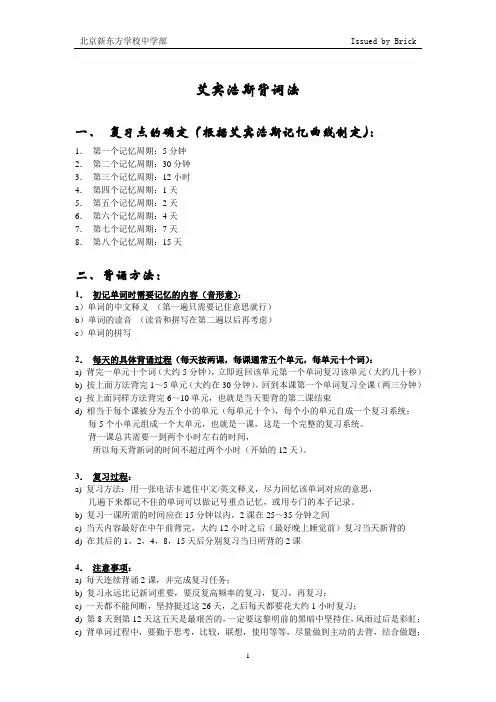
艾宾浩斯背词法一、复习点的确定(根据艾宾浩斯记忆曲线制定):1.第一个记忆周期:5分钟2.第二个记忆周期:30分钟3.第三个记忆周期:12小时4.第四个记忆周期:1天5.第五个记忆周期:2天6.第六个记忆周期:4天7.第七个记忆周期:7天8.第八个记忆周期:15天二、背诵方法:1.初记单词时需要记忆的内容(音形意):a)单词的中文释义(第一遍只需要记住意思就行)b)单词的读音(读音和拼写在第二遍以后再考虑)c)单词的拼写2.每天的具体背诵过程(每天按两课,每课通常五个单元,每单元十个词):a) 背完一单元十个词(大约5分钟),立即返回该单元第一个单词复习该单元(大约几十秒)b) 按上面方法背完1~5单元(大约在30分钟),回到本课第一个单词复习全课(两三分钟)c) 按上面同样方法背完6~10单元,也就是当天要背的第二课结束d) 相当于每个课被分为五个小的单元(每单元十个),每个小的单元自成一个复习系统;每5个小单元组成一个大单元,也就是一课,这是一个完整的复习系统。
背一课总共需要一到两个小时左右的时间,所以每天背新词的时间不超过两个小时(开始的12天)。
3.复习过程:a) 复习方法:用一张电话卡遮住中文/英文释义,尽力回忆该单词对应的意思,几遍下来都记不住的单词可以做记号重点记忆,或用专门的本子记录。
b) 复习一课所需的时间应在15分钟以内,2课在25~35分钟之间c) 当天内容最好在中午前背完,大约12小时之后(最好晚上睡觉前)复习当天新背的d) 在其后的1,2,4,8,15天后分别复习当日所背的2课4.注意事项:a) 每天连续背诵2课,并完成复习任务;b) 复习永远比记新词重要,要反复高频率的复习,复习,再复习;c) 一天都不能间断,坚持挺过这26天,之后每天都要花大约1小时复习;d) 第8天到第12天这五天是最艰苦的,一定要这黎明前的黑暗中坚持住,风雨过后是彩虹;e) 背单词过程中,要勤于思考,比较,联想,使用等等,尽量做到主动的去背,结合做题;三、具体时间流程(阴影右边的内容是复习内容)计划二:12天背完又:此表是以刘毅基础词汇为例,示范如何按照艾宾浩斯曲线安排背诵和复习得计划。
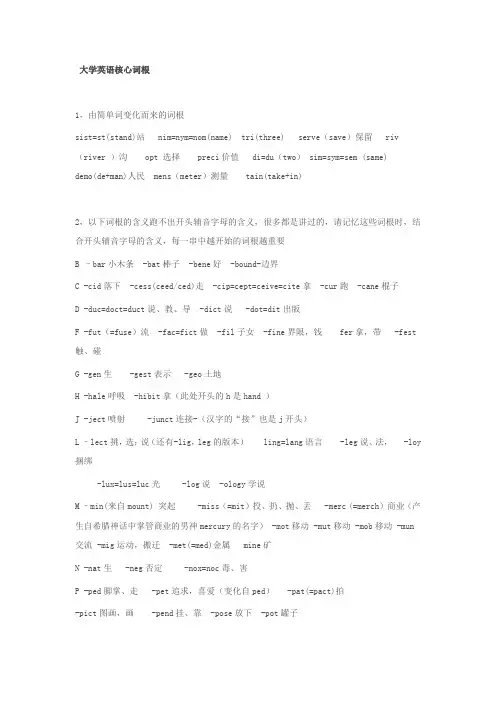
大学英语核心词根1,由简单词变化而来的词根sist=st(stand)站 nim=nym=nom(name) tri(three) serve(save)保留 riv (river )沟 opt 选择 preci价值 di=du(two) sim=sym=sem (same) demo(de+man)人民 mens(meter)测量 tain(take+in)2,以下词根的含义跑不出开头辅音字母的含义,很多都是讲过的,请记忆这些词根时,结合开头辅音字母的含义,每一串中越开始的词根越重要B –bar小木条 -bat棒子 -bene好 -bound-边界C -cid落下 -cess(ceed/ced)走 -cip=cept=ceive=cite拿 -cur跑 -cane棍子D -duc=doct=duct说、教、导 -dict说 -dot=dit出版F -fut(=fuse)流 -fac=fict做 -fil子女 -fine界限,钱 fer拿,带 -fest 触、碰G -gen生 -gest表示 -geo土地H -hale呼吸 -hibit拿(此处开头的h是hand )J -ject喷射 -junct连接-(汉字的“接”也是j开头)L –lect挑,选;说(还有-lig,leg的版本) ling=lang语言 -leg说、法, -loy 捆绑-lux=lus=luc光 -log说 -ology学说M –min(来自mount) 突起 -miss(=mit)投、扔、抛、丢 -merc (=merch)商业(产生自希腊神话中掌管商业的男神mercury的名字) -mot移动 -mut移动 -mob移动 -mun 交流 -mig运动,搬迁 -met(=med)金属 mine矿N -nat生 -neg否定 -nox=noc毒、害P -ped脚掌、走 -pet追求,喜爱(变化自ped) -pat(=pact)拍-pict图画,画 -pend挂、靠 -pose放下 -pot罐子R -rect直立 -rig直立 -rod=rot=ros破,烂,腐败 -rad草根;象根一样辐射 -rupt 突,破reg管理,规则S -sult跳 -sess坐,说 -soph智慧 -sip吸 -sent感觉T -tend延伸 -text课文,编织 -tone声调,腔调 -tut教 -tor(=tort)拧 -turb拧、转-tect盖子 -tense(=dense)紧、密(这是开头的t就是延伸的感觉,越拉伸越紧)V –viv活的 -vit生命 -vig活力 -vict胜利 -vag走 -vac空 -vad走 -vent走-vis(=vid)看-vid 分,看(“看”的时候就是vise变形导致)-view看 -val价值(wealth变化而来)-vary转变W –wag走三,这也是一种词根,一个辅音字母组合的含义中,逗号隔开就是一个含义的两种说法,分号隔开就是两种不同的含义bl-:吹风;颜色;污点 br-:破碎,分裂,产生; cl-:合并,集合; cr-:叫喊;爬、爬升;dr-:坠落;拽; dw-:低下,矮,短(由down变来) fl-:弯曲;飞,流; gl-:闪耀,光辉,(和亮度有关);gn-:知道(来自know); gr-:生长,增加;抓住;刻、写 kn-:节、关节 pr-:前,首先;ph-:说,表达;出现 pl-:折,弯腰;说 qu-:get,取、求; sc-:看;雕刻;爬升;scr-:爪子;shr-:缩,少,精; sl-:瘦,滑; sm-:小,微; sn-:口,鼻 spr-:喷洒、散射; squ-:挤压;st-:站,停留; str-:拉紧,扯紧(相对于松弛的)紧张 sw-:摇摆;thr-:三,多;穿过tr-:穿,戳,弄破,拉扯,从一处到另一处;tw-:二,双; wh-:转; wr-:手腕,拧,绕。
英语单词字根记忆(上百个字根)拆着背单词英语字根1,ag=do,act 做,动51,lingu=language语言101,sist=stand站立151,dorm睡眠201,noc,nox伤害2,agri=field 田地,农田(agri也做agro,agr)52,liter=letter文字,字母102,son=sound声音152,drom跑202,noct(i)夜3,ann=year年53,loc=place地方103,spect=look看153,ego我203,norm规范,正规,正常4,audi=hear听54,log=speak言,说104,spir=breathe呼吸154,err漫游,走,行204,nutri营养5,bell=war战争55,loqu=speak言,说105,tail=cut切割155,fabl,fabul 言205,orn装饰6,brev=short短56,lun=moon月亮106,tain,ten,tin=hold握,持,守156,feder联盟206,par生,产7,ced,ceed,cess=go行走57,man=dwell,stay居住,停留107,tect=cover掩盖157,ferv沸,热207,parl说,谈8,cept=take拿取58,manu=hand手108,tele=far远158,fict,fig塑造,虚构208,past喂,食9,cid,cis=cut,kill切,杀59,mar=sea海109,tempor=time时159,fid信任209,path(o),pathy疾病,疗法10,circ=ring环,圈60,medi=middle中间110,tend(tens,tent)=stretch伸160,fil线210,patr(i)父,祖11,claim,clam=cry,shout喊叫61,memor=memory记忆111,terr=land,earth土地,陆地161,flat 吹211,ped脚,足12,clar=clear清楚,明白62,merg=dip,sink 沉,没112,text=weave纺织162,flect,flex弯曲212,ped儿童,小孩13,clud=close,shut关闭63,migr=remove,move迁移113,tract=draw拉,抽,引163,flict打击213,petr(o)石14,cogn=known知道64,milit=soldier兵114,un=one一164,frag,fract破,折214,phag吃15,cord=heart心65,mini=**all,little小115,urb=city城市165,frig冷215,phil(o)爱16,corpor=body体66,mir=wonder惊奇116,vac,vacu=empty空166,fug逃,散216,phob(ia)怕17,cred=believe,trust相信,信任67,miss=send 投,送,发(miss也作mit) 117,vad,vas=walk,go行走167,fund,found底,基础217,plex重叠,重18,cruc=cross 十字68,mob=move动118,vari=change变化168,gam婚姻218,polis城市19,cur=care关心69,mort=death死119,ven=come来169,gram谷物,谷粒219,prim第一,最初20,cur,curs,cour,cours=run跑70,mot=move移动,动120,vert,vers=turn转170,grav重220,radic根21,dent=tooth牙齿71,nomin=name名121,vi,via=way道路171,greg群,集合221,ras,rad擦,刮22,di=day 日72,nov=new新122,vis,vid=see看172,gyn,gynce(o)妇女222,rid,ris笑23,dict=say说73,numer=number 数123,vit=life生命173,hal呼吸223,rod,ros咬,啮24,dit=give给74,onym=name 名124,viv=live活第二部分,多认词根,多识单词。
刘毅10000词汇学习笔记lesson 1(1)1.abdomen:part of the body below the chest and diaphragm, containing the stomach.腹部abdominal(adj) 腹部的an abdominal operation 腹部手术belly:(口)front of the human body from the waist to the groin;belly 肚子,胃with an empty belly 空着肚子belly out(动词用法):鼓涨,凸出The wind bellied out the sails2.bereave:使某人丧失(尤指亲属)bereave sb of sban accident which bereaved him of his wife 使他丧失妻子的事故the bereaved husband 死了妻子的男人the bereaved 丧失亲人的人bereavement(n):丧亲之痛,丧失亲人deprive:take sth away from sb; prevent sb from enjoying or using sth 剥夺sb/sth 的sth;阻止某人享有或使用sthdeprive sb/sth of sth deprive of one's civil rights 剥夺某人的公民权deprivation(n):剥夺;贫困;被剥夺的事物widespread deprivation 普遍贫困Missing the holiday was a great deprivation.错失假日是极大的损失。
deprived(adj):贫困的,穷苦的deprived childhood 贫苦的童年3. consecrate:devote sth/sb to or reserve sth/sb for a special (esp religious) purpose把sth/sb 献给sth/sb做某种(尤其宗教)用途consecrate sth/sb to sthconsecrate one's life to the service of God献身于为神服务的事业devote:give one's time, energy to sth/sb; dedicate 为某人付出,向某人奉献,献身于devote oneself/sth to sb/sthdevoted(adj):热爱的,非常忠实的,全心全意的a devoted son 孝子She is devoted to her children. 她深爱她的孩子。
学习英文最常遇到的一个问题,便是词汇不足。
一个词汇不足的人,在英文听、写、说各方面的能力都会受到严重的限制。
因此往往无法适当地与英美人士沟通意见;在参加考试时,更经常因为看不懂题目,而不知从何作答。
我们有鉴于此,特别为全国广大的英文读者编排了一系列的词汇丛书,从最基本的Vocabulary Fundamental,到足以应付留学考试之所需的Vocabulary 22000,循序渐进,为您扎实地打好词汇基础,无论您目前在校求学还是已步入社会,都会发现本系列书籍即是您苦寻已久,增强英文实力的最佳利器。
本书重点:单词的大家族→词根相同的词。
单词的联想→词义相似的词。
外来语→来自法语、意大利语、西班牙语等的单词,分量不容忽视。
衍生词→单词举一反三的秘诀。
研读本书,您的单词量将迅速增加5倍以上! Vocabulary 5000 1.本书所列单词共计1200个,加上各词的衍生词、同义词及反义词,则实际收录约2500词,均属于中上难度的词。
读完本书,您的单词量当在5000词以上。
2.详细列出各词的国际音标、词性说明及中文解释,省却查字典的麻烦,并附有英文解释,以培养直接用英文思考、判断的能力。
中英文解释均是以该词最常用的意义为主,一词若有若乾常用解释或词性,则一并列出。
单词后面附有例句,以说明该词的用法;例句附有中文翻译,以便对照参考。
3.每一课分为四个部分,以便于分段记忆。
在课前有预备测验,每一部分之后有习题,课后有效果检测;可借助于重复测验来加深对单词的印象,并学习如何活用单词。
4.本书共分为22课,建议进度为一天一课,如此便可在一个月内增加2500个词汇。
下载链接第一课的单词Barren adj.贫瘠的同:sterileThe barren land could produce little food.Bump v.碰撞同:collideThe room was dark and I bumped my head against the door.Devise v.设计;发明同:inventHe devised a new method for teaching the blind.Exert v.使用同:useMy wife’s been exerting a lot of pressure on me to change my job.Intrigue 1. n.阴谋同:conspiracy 2. v.引起…的兴趣The king’s younger brother took part in the intrigue to make himself king.The book’s unusual title intrigued me into reading it.Oath n.宣誓;誓言同:pledgeHe placed his right hand on the Bible as he spoke the oath of office.Postpone v.延期同:adjournThe had to postpone their trip because of rain.Refuge n.避难所;避难同:shelterThe cat took refuge from the dog behind a tree.Regain n.恢复同:recoverIt took her a long time to regain her health.Shatter v.破灭;粉碎同:smashTheir hope of finding him alive was shattered when his dead body was found.Tease v.嘲弄同:vexAt school, the other children always teased me because I was fat.Tilt v.倾斜同:inclineHe tilted his chair back too far and fell on the floor. Version 1. n.翻译同:translation 2. n.叙述Do you have the English version of this bookYour version of the accident differs from that of the other witness.Absurd adj.荒谬的反:reasonableHis belief that he was too clever to be cautht in his wrongdoing was absurd.Alien adj.外国的反:domesticAfter ten years his alien speech was still noticeable. Amiable adj.和蔼可亲的反:spitefulShe is an amiable girl and gets along with everyone in the office.Ban v.禁止反:allowIn most countries the sale of liquor to children is banned. Figurative adj.比喻的反:literal“The sweet temper” is a figurative expression,but “sweet coffee” is not.Genuine adj.真正的反:falseHer wedding ring is made of genuine diamond.Hoist v.升起反:lowerThey hoist the national flag at six o’clock every morning. Incorrect adj.不正确的反:accurateThe newspaper gave an incorrect account of the trafficaccident.Massive adj.巨大的反:tinyThe house was build on a massive rock.Stale adj.不新鲜的反:freshThere was only a piece of stale cake left in the refrigerator. Thrive v.茂盛反:declineThe buy at wholesale and sell at floers will not thrive without water and sunshine. Wholesale n.批发反:retailAnnoy v.骚扰 n. annoyanceThe baby is always annoying his sister by pulling her hair. Celebrate v.庆祝 n. celebrationWe celebrated Christmas with trees and presents.Diplomat n.外交家 n. diplomacyThe unsociable person is hardly fit for a diplomat.Foresee v.预知 adj. foreseeableIt is impossible to foresee whether she’ll be well enough tocome home from hospital next month. Induce v.说服 n. inducement We couldn’t induce the old lady to travel by air.Mobilize v.动员 n. mobilizationOur country is in great danger;we must mobilize the army. Precede v.在前 n. precedentMr. Eisenhower preceded Mr. Kennedy as president of the United States.Predetermine v.预先决定 adj. predeterminateSome people bel ieve that man’s destiny is predetermined. Prevail v.流行 adj. prevalentMaking resolutions on New Year’s Day is a custom that still prevails.Subtle adj.精致的;淡的 n. subtletyHer subtle smile made him curious.Transact v.办理 n. transactionThe man transacts many affairs connected with the purchase ofa home.Treason n.叛国 adj. treasonousHelping the enemies of one’s country is an apparent treason. Utilize v.利用 n. utilityHow can we utilize his knowledge and skill to our advantage Bosom n.胸She wore a flower on the bosom of her dress.Diploma n.文凭When a person has successfully completed a certain course of study, he is given a diploma by theschool.Dramatic adj.戏剧的The meeting between the mother and her blind son was dramatic. Fume n.烟;气体The strong fumes of the automobile exhaust early choked him. Hurrah n.欢呼声“hurrah!” they shouted as the team scored again.Miniature 1. n.缩小之模型 2. n.缩小物In the museum there is a miniature of the ship “Mayflower.”The child was playing on the floor with his collection of miniature farm animals.Parcel n.包裹On her birthday her arms were filled with gift parcels.Pill n.药丸The pill stuck in his throat but an extra drink of water washed it down.Racket n.喧哗The students made a big racket as they left the school. Rhyme n.音The poet used the word “flight” as a rhyme for the word “night”.Scar n.疤The man looks terrible; he has many scars on his cheeks. Sculpture n.雕刻There are many famous sculptures in the museum.Skip v.跳When I read a book, I usually skip over; he uninteresting part.练习:本期的生词中选出适当的填空。
sist词根词缀词根:—sist—, —stat-, —sta-,—st-【词根含义】:站立,放置【词根来源】:—sist-, —stat—,—sta—和—st-来源于拉丁语动词sisto, sistere,steti,status(安置,站立)和sto, stare, steti, status(站立,放置),以及拉丁语名词statio, stationis, f (站立); 可追溯至原始印欧语sta-(站).【同源单词】:assist,coexistence,consist, consistency,consistent词根:st, sta,, stat,stit,sist,stitut = to stand(站立)这是一组非常重要的词根,也是一组非常有意思的词根,先说一下这组词根的重要性,这组词根派生出来的单词基本上都是日常常用词汇,他们不仅重要,而且在所有词根里面的派生出来的单词也是数量非常大的词根之一,它们的派生能力非常强悍;这是一组非常有意思的词根,我们知道我们中国有一句人人都为之激动的话就是在我们国家成立时,毛泽东向世界宣布“中国人民从此站起来了”,而很多国家在国名中把表示“站立”的stan加进去了,如巴基斯坦Pakistan、阿富汉Afghanistan 等。
stanr中的关键成分st.st本身就是个词根,加上in,it,at,or等形成了st,sta,stan,stin,stab,stal,stor,stat,stit,sist,stitut一系列词根,实际上都是sta的变化形式。
sist是两个st的重复,看起来更像st与is的组合。
词源:sist ①来源于拉丁语sistere (v.)站立;②来源于希腊语histanai 设置,使站立;③sist = st (stand) 站,它是词根st 的变体,stitut 属于富贵词根,古代社会为更好的区分社会等级,专门编造的专供富人使用的词根有同形异义词根:st(i),ste,sto,stand,stat 站.反义词根有来自拉丁语的sed,sid,sess等。
3. abdomen [ ✌♌♎☜❍☜⏹] n. 腹,下腹(胸部到腿部的部分)ab-加强语气,(away)dome-屋顶,home-家en=er=el-名词后缀belly-腹部、肚子n -l -r 的关系man——malepan——palm3712. predominant [☐❑✋♎❍✋⏹☜⏹♦]a. (over)占优势的;主要的,突出的dominant-支配的dominate-支配gasoline汽油pro-向前pre-在前4. abide [☜♌♋✋♎] vi. (by)遵守,坚持;持续,住,逗留vt. 容忍,忍受;等候abide by a-加强语气阿姨老师bite-咬summerwinderpresident-总统、总裁(pre sid=sit ent)student3264. obedience [☜♌♓♎✋☜⏹♦]n. 服从,顺从obedient-服从的、顺从的obey-顺从,听任摆布7. abnormal [✌♌⏹❍☜●] a. 反常的,不正常的,不规则的ab-不,远离away-离开social-社会的3221. norm [⏹❍] n. 准则,规范,准则,平均数normal标准的norm-标准neither nor ——既不…也不neutral-中立的neutron中子neutr——neither9. abolish [☜♌●✋☞] vt. 废除(法律、习惯等);取消ab-不ol-词根:生长oldish-动词后缀finishfinal87. adolescent [ ✌♎☜●♏♦☜⏹♦] n. 青少年a. 青春期的,青少年的ad-add——toad+ol+escentado+lesc+entadold-成人(拉)adult-成人870. coalition [ ☜☺☜●✋☞☜⏹] n. 结合体,同盟;结合,联合co-al-itionco=com=con-共同al=olition-复合名词后缀3291. odd [ ♎] a. 奇数的;奇怪的;单只的;临时的;带零头的,古怪的ol-old-老、成tower-塔,城市badminton-羽毛球town——tow tondonate-捐赠endow-捐赠dow+don——down2hour10. abound [☜♌♋☺⏹♎] vi. 大量存在;(in,with)充满,富于a-否定bound-词根:边界board-板子,上船boat-船border-边界、边缘oar-橹、桨abundance丰富abundant丰富的、充裕的553. boundary [ ♌♋☺⏹♎☜❑✋] n. 分界线,边界ary-名词后缀factory-工厂(fact-)salary-薪水(salt-)14. abrupt [☜♌❑✈☐♦] a. 突然的,出其不意的;(行为等)粗鲁无礼的,唐突的ab-加强语气,rupt-词根:破裂ripe成熟pea豆rupt=break为什么“rupt-词根:破裂”erupt(e=ex) 火山爆发reluctant-不情愿的like-喜欢agriculture-农业(agri-土地acre-亩、田地cult-种植)colony-殖民地1107. corrupt [ ☜❑✈☐♦] v. 贿赂,收买a. 腐败的,贪污的cor=com=con共同/加强语气4149. rip [❑✋☐] v. 撕,剥,劈,锯,裂开,撕裂n. 裂口,裂缝ripe-成熟17. absolute [ ✌♌♦☜●◆♦] a. 绝对的,完全的;确实的,肯定的,唯一的ab-加强语气唯一的——绝对的绝——所谓“绝情的,绝后的,绝交”1031. consolidate [ ☜⏹♦●✋♎♏✋♦]v. 使加固,使加强;(把…)联为一体,合con-solid-atesolid-固体的并liquid-液体的gas-气体4522. solemn [ ♦●☜❍] a. 庄严的,隆重的;严肃的谐音“索罗门”sole-唯一、独特——至高无上4524. solidarity [ ♦●✋♎✌❑✋♦✋]n. 团结;休戚相关solid-arityary-后缀ity-名词后缀4525. solitary [ ♦●✋♦♏❑✋]a.(好)孤独的;偏僻的;单一的,唯一的n. 隐士sol-itaryite-后缀ary-后缀“少林腿”4526. solo [ ♦☜☺●☜☺] n. 独奏a./ad. 单独的(地);独唱的(地)oral-口头的aural-听力的audio-音频video-视频piano-钢琴radio-收音机3514. peninsula [☐☜⏹✋⏹♦☺●☜]n. 半岛pen-i n s u l aisolate-使孤独、隔离(in)isol——islisland-岛屿(ant-and)land陆地pan-全、盘pen-半140. aisle [♋✋●] n. (教堂、教室、戏院等里的)过道,通道,耳廊,侧廊a-isl-e2621. island [ ♋✋●☜⏹♎]n. 岛,岛屿;(道路上的)交通安全岛land-陆地2622. isle [♋✋●] n. 小岛(用于诗歌中) le/el-小label-标签18. absorb [☜♌♦♌] vt. 吸收;使全神贯注ab-加强语气soup-汤吸吮——[shun]?[yun]? sorb-吸收19. abstract [ ✌♌♦♦❑✌♦][☜♌♦♦❑✌♦] a. 抽象的n. 摘要,梗概vt. 提取;摘录要点ab-s-tractab-加强语气s-加强语气slim-苗条的(lim-line)scar-刀疤(carve-刻、砍、割)sneeze-打喷嚏(neeze-nose)tractor-拖拉机tract-词根:拉、拽drag-拉扯、拽多音字:湘方言“同志们、朋友们”暴露、血泊、瓦窑堡会议330. attract [☜♦❑✌♦] vt. 引起的注意(或兴趣等),吸引;引起;激起a??——attractive-有吸引力的所谓:这个女人很“拉风”…4750. subtract [♦☜♌♦❑✌♦]v. (from)减(去) sub-向下subway-地铁3hour5103. trigger [ ♦❑✋♈☜] n. 扳机vt. 触发,引起trig-gertrig=trict=trag-拉扯“扣动扳机”“拉动扳机”20. absurd [☜♌♦☜♎] a. 荒谬的,荒诞的,荒唐可笑的;不合理的ab-surdab-加强语气surd-无理数,荒谬的24. academic [ ✌☜♎♏❍✋] a. 学院的,大学的;学术性的;理论的Akademos-阿卡蒂摩斯Zeus-宙斯Chaos-凯厄斯26. accelerate [☜♦♏●☜❑♏✋♦] v. 使加速,使增速,促进vi. 加快,增加ac-celer-ateceler-词根:速度sel-词根:跳sult-词根:跳result结果celerity [♦♓●♏❑♓♦♓]⏹敏捷 快速♓♦⍓名词后缀30. access [ ✌♦♏♦] n. 进入;接入;到达;享用权;入口vi. 存取cess-词根:走success-继续、成功“成功”≠“胜利”victory-胜利subway983. concession [ ☜⏹♦♏☞☜⏹] n. 让步,妥协;特许(权)con-cess-ion975. concede [ ☜⏹♦♓♎] vt. 承认;容许;(比赛结束前)认输;退让cessceedcedeexpand 膨胀expansiond/s/t3703. precede [☐❑♓♦♓♎]v. 领先(于),在(…之前);优先,先于pre-在前proceed-继续进行precede-领先于3951. recede [❑✋♦♓♎] v. 退回,后退;收回,撤回;跌落,缩减,贬值723. cease [♦♓♦] v./n. 停止,终止ceas e≈cess-走“人走茶凉”“停电了,走电了!”34. acclaim [☜●♏✋❍] v. 向…欢呼n. 欢呼,喝彩,称赞ac-claimac-加强语气claim-词根:喊cry-喊叫、哭嚎r/lcreep-爬行climb-攀登821. claim [ ●♏✋❍] v. 要求;声称;索赔n. 要求;断言;索赔;权利3776. proclaim [☐❑☜●♏✋❍]v. 宣告,声明pro-向前3962. reclaim [❑✋●♏✋❍]v. 要求归还,收回;开垦荒地re-向回exclaim-呼喊、求救35. accommodate [☜❍☜♎♏✋♦]vt. 向…提供住处;对…予以照顾性考虑,给…提供方便,容纳ac-commod-atecommodity-商品,日用品36. accommodation [☜❍☜♎♏✋☞☜⏹]n. 住宿,留宿;膳宿供应ac-commod-ation921. commodity [ ☜❍♎✋♦✋] n. (pl.)日用品;商品;农/矿产品;有用之物com-mod-itymode-模式、模型model-模特38. accomplish [☜❍☐●✋☞] v. 实现(计划等);达到(目的);完成(任务)ac-compl-ishfinish-完成finite-有限的,有穷的polite-礼貌的polish-擦光、磨光complete [ ☜❍☐●♓♦]♋♎ 全部的完全的 完成的951. complement [ ❍☐●✋❍☜⏹♦] n. 补足物,船上的定员;补语vt. 补充,补足ment-名词后缀(实物)ion-名词后缀(抽象)completion-圆满、完美4hour4796. supplement [ ♦✈☐●✋❍☜⏹♦]n. 补遗;增刊;附录v. 增刊,补充su??——sub-下45. accumulate [☜◆❍☺●♏✋♦] vt. 堆积,积累,积聚vi. 累积,聚积ac-cum ul-atea??——cum-词根:积云、积累日语“云”——“kumu”cum ul ous-积云的simulate-模拟(sim=same-相同)46. accuracy [ ✌☺❑☜♦✋] n. 准确(性);精确;准确度curious-好奇的care-关心cure-关心、关注陀螺相似——foodfeed47. accurate [ ✌☺❑☜♦] a. 正确无误的;准确的,精确的体会“ate”与“acy”的音似1186. cure [ ☺☜] v. (of)治愈,医治;矫正n. 治愈,痊愈;良药cur-词根:关怀、关爱4293. secure [♦✋☺☜]a. (from,against)安全的,放心的v. 使安全;防护se-分开separate-分开的;分开(pair)security-安全1185. curb [ ☜♌] n. 路边,场外证券市场vt. 制止,抑制圆形马路崖子1195. curve [ ☜] n. 曲线,弯曲(物)v. 弄弯,成曲形[b]/[v]语音通假cur-词根:跑patriot-爱国者pater-父亲ot-名词后缀father-父亲f/ps+h=shc+h=chp+h——ph——phone compatriot——同胞patriotic-爱国的p/f/b/v/mcur-关心cur-跑1191. current [ ✈❑☜⏹♦] n. 电流,水流;潮流,趋势a. 当前的;流通的cur-r-entr-无义,ent-形容词/名词1742. excursion [✋♦☜☞☜⏹]n. 短途旅行,游览;离题;[物理]偏移,漂移curs-词根:跑course-过程,课程of course 当然2469.incur [✋⏹☜] v. 招致,惹起,遭受3286. occur [☜☜] v. 发生,出现;存在;想起,想到3976. recur [❑✋☜] v. (尤指不好的事)一再发生;重现re+occur——recur1192. curriculum [ ☜❑✋☺●☜❍] n. 课程,(学校等的)全部课程car-车cur-词根:跑curs-词根:跑course-过程、路程、课程1105. corridor [ ❑✋♎] n. 走廊,通路,通道idor-复合名词后缀重音是重点cur-cor-走48. accuse [☜◆] vt. 控告,指责vi. 指控,指责excuse-原谅curse [ ☜♦]⏹诅咒 咒语祸根 祸因“克死”1208. Damn [♎✌❍] int. 该死vt. 遣责;使失败a. 十足的ad. 极“大骂”988. condemn [ ☜⏹♎♏❍] v. 谴责,指责;判刑,宣告有罪con-加强语气curse-骂人accuse-谴责250. appropriate [☜☐❑☜☺☐❑✋☜♦][☜☐❑☜☺☐❑✋♏✋♦] a. 适当的,恰当的,特有的vt. 拨给,挪用,盗用ap-propri-atepropri=properproper-适合的private-私人的propprivproper-适合的,个人的,特有的property-财产50. Ache [♏✋] vi. 痛;哀怜n. (指连续)疼痛、酸痛school-学校126. agony [ ✌♈☜⏹✋] n. (精神或肉体的)极大痛苦,创伤act-行动,作为“爱过你”124. agitate [ ✌♎✞✋♦♏✋♦] v. 摇动(液体);使焦虑不安;困扰;鼓动agit-ateact-行动,作为890. colleague [ ●♓♈] n. 同事,同僚collect+act+uecolle+ag+uelecture-讲座legend-传奇、故事(lect-讲end=ent-后缀)52. acid [ ✌♦✋♎] n. 酸,酸性物质a. 酸的,酸味的;尖刻的Angle-尖角Ang-词根:尖角Ac-词根:尖id-化学后缀69. acute [☜◆♦] a. 剧烈的;敏锐的;成锐角的;尖的,高音的Ac-词根:尖ute-后缀5hour54. acquaint [☜♦♏✋⏹♦] vt. (with)使认识,使了解,使熟悉a??——quain-词根:知道motion-运动(ion-后缀mot-move)quain-cogn-知道878. cognitive [ ♈⏹✋♦✋] a. 认知的,认识能力的cogn-itivecogn=co+gn——知道gnknow3964. recognize [ ❑♏☜♈⏹♋✋]v. 再认出,认出,承认,公认,赏识,表扬re-cogn-izere-再一次“认”=“知”3963. recognition [ ❑♏☜♈⏹✋☞☜⏹]n. 认出,辨认;承认ize—ition2411. ignorant [ ✋♈⏹☜❑☜⏹♦] a. 无知的,愚昧的;不知道的im-i-不gnor-knoant-的2412. ignore [✋♈⏹] v. 不理,不顾,忽视gnor-知道i=im-不cogn=co+gn70. adapt [☜♎✌☐♦] vt. 使适应,使适合;改编;改写vi. 适应ad-加强语气,apt-适合、易于a p p ropria t e-恰当的255. apt [✌☐♦] a. 恰当的,适当的;易于…的,有…倾向的be apt toxp 系统——experience体验、经验250. appropriate [☜☐❑☜☺☐❑✋☜♦][☜☐❑☜☺☐❑✋♏✋♦] a. 适当的,恰当的,特有的vt. 拨给,挪用,盗用He is apt to fly out in arage。
刘一男词汇速记教材刘一男词汇速记教材-2525 3.verge[ []n. 边,边缘 v. 濒临verg-词根:转356. aviation 3164 navy . 363. awe 364. awful 365. awkward] [ ][ [ [ ]] ]369. bachelor 374. bacterium 373. bacon 376. badge 381. bait 385. bald 530. bold 397. banner bound[ ] [ ] [ ] [ [ [ [ [ ] ] ] ] ]n. 航空,航空学;飞 aviary n.鸟舍,鸟笼 机制造业 av-鸟 nav-舟 n. 海军 naval-航海的 navigate-v. 航 海 (ig=ag=act) navigation-n.航海 n. 敬畏,惊惧 “噢”! 拟声词 vt. 使敬畏,使惊惧 “O”! a. 极度的,极坏的; 威严的,可怕的 a. 笨拙的;尴尬的; backward-往后、向后 使用不便的;难处理 forward-向前 的 inward 向里 outward 向 外 … awk-反→(away-离开、 背离) n. 单身汉;(亦作 B-) 光棍 学士(学位) bach-棒 back-后背、 “板” n. 细菌 bact=bach-棒 “大肠杆菌” 杆 n. 咸猪肉,熏猪肉 bac-bake-烤焙 n. 徽章, 像章; 标记; badge 象征;记号 board-板子 “牌牌儿”“板板儿” 、 n. 饵,引诱物 bite-咬 vt. 用饵引诱;折磨, 奚落 a. 秃的,秃头的 ball-球 d-id- 形容词后缀 a. 大胆的,勇敢的; bole-树干 冒失的;黑体的,粗 bone-骨头 体的 “粗”——“鲁” n. 旗(帜) ban=band-词根:布条 bandage n. 绷带 n. 跃进, 跳, 范围, band-词根:布条 限度 adj. 正要启程的, 开 往...去的, 被束缚的, 装订的 v. 跳跃, 限制 n. 结 合 ( 物 ) , 粘 结 band-词根:布条 (剂),联结;公债, 债券,契约1533. bond[]刘一男词汇速记教材刘一男词汇速记教材-2622. bundle 621. bunch[ [ ]]n. 捆,包,束398. banquet[ ]570. breach 401. barber 1751 exhibit . 2511. inhibit 3793 prohibit . 17ho ur 406. barn[ [ [ ] [ ] [ ] [] ]band-词根:布条 bound — —bond /bund — —绑 n. (一)簇,束,捆, band-词根:布条 串 road-路 throat-喉咙 approach-途径;接近 n. (正式的)宴会 电影《夜宴》 vi. 参 加 宴 会 vt. “坐席” 宴情 “不散的筵席” supper——soup banqu——bench-板凳 n. 违反,不履行;破 break 裂 vt. 冲破,攻破 n. 理发师 barb beard-胡须(b 与 d 写反) v. 展出,陈列 ex-出来 hibit-拿 n. 展览品,陈列品 hib-it——hand+it stand——stat-stit vt. 抑制,约束 hibit——hand+it-拿 v. 禁止,不准;阻止 hibit——hand+it-拿408. barren 2386 hurl .[ [59. acrobat 463. beneath[ ] [5458 wreath . 3144 myth .[ [ ]barn barley- 大 麦 、 裸 麦 (bar+l+ey) bare-赤裸裸的 ] a. 贫瘠的;不育的; en-后缀——词性 (植物)不结果的;无 en-前缀——使动 用的 ] vt. 猛投,力掷,猛 OED suggests all are 掷 from onomatopoeic *hurr "expressing rapid motion;" hurry-匆忙 n. 特技演员, 杂技演 Acro-前缀:高 员 bat-蝙蝠 ] prep. 在 … 下 边 , be-在 在…之下 neath-下 ad. 在下方 下:down?low? under? —— next-下一个 ] n. 花环,花圈 wrist-手腕 n. 神话; 虚构的理论 mystery[ ] n. 神秘, 神秘的事物2]n. 谷仓,仓库刘一男词汇速记教材刘一男词汇速记教材-2466. benign[ ] [ ]535. bonus474. beverage imbibe[ ] [ ]476. bewilder wild mild[ ] [ [ ] ]myst+story mist-雾 a. (病)良性的, (气候) bene-good 良好的,仁慈的,和 bene-well 蔼的 ign-ine foreign n. 奖金,红利 bon-好 ben-好 “好处” 陀螺相似 n. (水,酒等之外的) bever—— 饮料 bibe 吸收 im-in pipe 管子 pore-口、孔 bore-钻孔 v. 使迷惑,难住 be-wild-er 野性的,狂热的 “狂风”“疯狂” 、 wind wild 温和的,温柔的 “中庸”“中不溜”“中 、 、 和” mild middle n. 魅力;魔法 alt. of Eng. vt. 迷惑 grammar (q.v.) with a medieval sense of "any sort of scholarship, especially occult learning." v. 描述,形容 scribe-词根:写 为什么—— “scribe-写” ?? “乱爬拉、乱划拉…” s+cribe creep v. 指 示 , 规 定 ; 处 pre-先 (方),开(药) “丑话在先” n. 剧本(原稿); 手稿, scribe-词根:写 原稿;笔迹,手迹 scrib+t=script vi. (to)订阅,订购; sub-底下 同意 vt. 捐助,赞助 scribe-词根:写 n. 意识形态,(政治 -ology——学说 或社会的)思想意识 biology n. 心理,心理学,心 Psych-心理女神:普塞克 理状态 n. 标语,口号 s+log+an log-唠嗑32113. glamour[]1308 describe .[ ]3726 . 4277 . 4743 . 2404 . 3836 . 4476 .prescribe script subscribe ideology psychology slogan[ ] [ [ ] [ ] [ [ ] ] ]刘一男词汇速记教材刘一男词汇速记教材-2497. bizarre 501. blade 18ho ur 501. blade 2007 fraction . 2008 fracture . 2009 fragile . 2010 fragment . 515. bloom 516. blossom[ [ ]]adj. 异乎寻常的,稀 beard-胡子 奇古怪的(奇装异 服) n. 刀刃, 刀片; 桨叶; 草叶,叶片 flat-扁平的 n. 刀刃, 刀片; 桨叶; 草叶,叶片 flat-扁平的 n. 碎片,小部分,一 fract-词根:破碎 点儿;分数 ion-名词后缀,表抽象的 n. 裂缝(痕);骨折 fract-词根:破碎 v. (使)断裂, (使)折断 a. 易碎的,脆的,易 fract-词根:破碎 损坏的;虚弱的,脆 ile-ible-able 能… 弱的 n. 碎片,小部分,片 frag=fract 断 break-单词:破碎 fract-词根:破碎 n. 花(朵);开花(期) flow er v. 开花 bloom[ [ ] [ ] [ ] [ ] [ []] ]502. blame[1827 fame . 2490 infant .[ [3797 prominent[n. 花(簇);花期;青 ss 春 vi. 开花;展开;繁 荣 ] v. 责备;怪,把…归 contraction –压缩 咎于 blaspheme[ n. 责任,过错;责备 ] 亵渎 咒骂 辱骂 ( 爆 炸 名字) 名声 著名的 ] n. 名声;名望;传说 著名的 vt 使出名;传扬…的 名 ] n. 婴儿,幼儿 in-fan-t (不能说话) a. 婴儿的 fame-名声 name-名字 fame-名声——说 in+fame+t=infamt — — infant child- 孩 子 (cheer 欢 呼) bold-粗、鲁 (bold) bald-秃 (ball) a. 突起的,凸出的; contraction-压缩4刘一男词汇速记教材刘一男词汇速记教材-2. 5166 undermine . 2991 menace . []突出的,杰出的] [ ]4814 survey . 506. blaze 509. blend[ ] [ ] [ [min-词根:突出 “前凸后翘”“~峰” 、 min——mountain v. 暗中破坏,逐渐削 mine-矿山;采矿 弱;侵蚀…的基础 vt./n. 有危险性的人 from minax (gen. (或物);威胁,威吓 minacis) "threatening," from minari "threaten, jut, project," from min "threats, projecting points." minmen-陀螺相似 (无奈联想 men-男人) v. n.俯瞰,眺望;全 Super-vise面审视,调查;测量 v.监督, 管理, 指导 图,勘定 video-视频 n. 火焰; 火光; 闪光, bl-burn 光辉,激情 (联想 b-不 laze-lazy) v. 燃烧,冒火焰 n. 混合(物) bland-清淡的、平淡的、 v. 混和,混杂 温和的、柔和的 bland vegetable-清淡的蔬 菜 blend well——配合地不 错 bland 平淡 flat-平 blade-刀刃、刀片、桨片 片 片 (不累的——) n. 女衬衣,短上衣, blou-blow 吹 宽阔的罩衫 blow+clothes 衣服 “蝙蝠衫”——盛行 “紧身衣”——禁忌 a. 谨慎的,智慧的, pro-vid-ence-远见卓识 稳健的,节俭的,审 provident-远见卓识的 慎的 provident-o-i=prudent n. 全体船员, 全体乘 务员 v. 征募(新兵), 吸收; “新” re-再一次 补充 flu-流感 n. 新成员,新兵 flow-流 v. (因无知等而)犯大 “盲目” 错;踉踉跄跄地走 blund n. 大错 blind a. 率直的;钝的 “盲目” v. (使)钝;(使)迟钝 wise vise5] ]517. blouse[ ]3834 prudent . 1152. crew 3973 recruit . 521. blunder 522. blunt[ ] [ [ ] [ ] [ ] ]刘一男词汇速记教材刘一男词汇速记教材-2I see 19ho ur 523. blur 4619 spur . 524. blush 545. bosom 551. bounce bound 555. bowel 561. brace 562. bracket 624. bureau 625. bureaucracy 579. breed [ [ [ ] [ ] [ [ ] ] ] ][ [ [ [ [ ]]] ] ]n. 模糊不清的事物; blear-模糊的 污点 ab clear vt. 使模糊;玷污 n. 靴刺, 马刺; 刺激, spear-矛、刺、标枪 刺激物 v. 刺激, 激 励 v./n. 脸红,红 blood-血 flush 脸红 n. 胸,胸部;胸怀; 词源:boom 隆隆声 内心 联想:boss a. 亲密的 n./vi. (球)弹起, 弹回; 弹起,跳起;n. 弹力 1 跃进;2 被束缚的; “蹦跶” 3 边界 n. 肠; [pl.]内部,深 bow-弯曲、弓 处 elbow [ ]n. 肘 else bow v. 使防备;支撑;使 brace-四肢 (手,足,肩等)绷紧 branch-树枝 n. 托架 “树枝”——“四肢” n. 墙上凸出的托架, brack 括弧, 支架 branch n. 署,局,司,处 “办公室” bur-红色 burn-火、燃烧 n. 官僚主义, 官僚机 bur-eau-cracy 构;(非民选的)委任 demo-cracy-民主 官员 v. (使)繁殖,生殖; feed 产生;教养,抚养 food n. 品种 brood n.一窝 brother-兄弟 a. 易碎的;脆弱的; break——brit 冷淡的;(声音)尖利 le-able 的 break+able——brittle n. 贿赂 from O.Fr. "morsel v. 向…行贿,买通 of bread given to beggars," bread+beggar=bribe 新娘592. brittle[]581. bribe[]bride[]6刘一男词汇速记教材刘一男词汇速记教材-2586. briefcase 649. cage 588. brilliant[ ] [ [ ] ]n. 手提箱, 公事皮包 case-盒子,案例 cash-现金 “钱匣子” n. 鸟笼,笼子 [s]/[g]语音通假 a. 光辉的,灿烂的; brill-词根:光 卓越的,有才华的 umbrella n.雨伞(拉: 阴影) brell-词根:光 n. 边缘,帽沿 rim 边 轮缘 蓝框 环589. brim[]595. brochure prick[ ] [prik] n. 小册子3990 refrain .[ ]602. browse 605. brutal 609. budget 626. burglar[ [ ] [ ] [ ] ]643. cabbage[ ]676. cape 679. capsule 4251 scarf .[ [ ] []]broch-ure broch-词根:装订 vt. 刺, 戳, 刺痛, 竖 break v.打破 起 vi. 刺, 竖起 v. 节制,避免,制止 frain-词根:破坏 n. (诗的)叠句 break refrain-破坏(break) restrain- 抑 制 ( string- 紧 绷) vi. 随意翻阅,浏览; (brow 眉毛 (牛、羊等)吃草 se-see)联想 a. 残忍的;严峻的; 大力水手 严酷的 n. 预算 budg + et—— v. 做预算 burse-钱包 n. (入室行窃的)盗贼 burgle- 偷 盗 (burg- 城 堡 le-后缀) lie liar n. 洋白菜,卷心菜 cab-词根:头 capital-首都 cap-词根:头 cap-帽子 head hat n. 海角,岬;披肩, cap-帽子 短披风 cap-词根:头 n. 胶囊;太空舱 caps—— nat-ure-自然 n. 围巾, 头巾, 领巾, s-carf 领带 carf-词根:头 cap--词根:头7刘一男词汇速记教材刘一男词汇速记教材-2644. cabin[]645. cabinet[ ]651. calcium 652. calculate 20ho ur 1237 decade .[ ] [ [ ] ]n. 客舱, 机舱; 小(木) cab——?? 屋 cave-洞 in-在里面 move mobile n. 内阁,内阁会议; cab (带玻璃门存物品的) n. 出租马车, 出租汽车, 橱柜 计程车, (机车, 卡车, 起 重机的)司机室 驾驶室 司机室, 司机室 n. 钙(化学符号 Ca) calc-词根:小石子 “咔咔” ium 化学的后缀 v. 计算, 推算; 计划, calc-词根:小石子 打算 n. 十年 dec-ade digit-al-数字的 digit-手指头 dig——单词:挖掘 dig——词根:手指头 imal-的 dig=dec=dex1244 decimal . 2473 index . 1232 dean .[ ] [ ] []a. 十进的,小数的, 十进制的 n. 小数 n. 索引,指数 v. 附以索引 n. (大学)院长;主持 牧师(基督教)教长660. campaign[ ]750. chamber 669. cannon 670. canoe 674. capable 675. capacity[ ] [ [ [ ] [ ] ] ]from L.L. decanus "head of a group of 10 monks in a monastery," “十夫长” n. 战役;运动 campus-大学校园 camp-田野 aign-ain+g mountain captain n. 房间, 会议室; chamb 室; 议院;(动物体内)腔 camp 室 n. 大炮,火炮 cann-on cane-棍子、茎、管子 n. 独木舟,小游艇 cane+o a. 有本领的, 有能力 cap-able 的;(of)可以…的, cap-capt-cept-抓 能…的 “黑猫白猫抓到…好猫” n. 容量, 容积; 能量, 能力——能量——容量 能力;接受力 ——接受力8刘一男词汇速记教材刘一男词汇速记教材-2681. captive 682. capture[ ][ ] 684. carbohydrate [ ]n. 俘虏 a. 被俘虏的, 被监禁 的 v./n. 捕获,俘虏;夺 得,攻占 n. 碳 水 化 合 物 , 糖 类;(plural)淀粉质或 糖类capt-词根:捉 cept-词根:拿 capt-词根:捉 cept-词根:拿 carbo-hydr-ate carbon 碳 hydr-水 hydrogen- 氢 ( hydr- 水 gen-生) oxygen-氧 carp-木 carb-碳 corn-玉米693. carpenter 4268 scorn . 706. cast[ ] [ [ ] ]n. 木工,木匠 v./n. 轻蔑,藐视v. 投,扔,掷,抛; The noun sense of "a 铸造; 投票 n. 演员 throw" (c.1300) carried an idea of 表 the form the thing takes after it has been thrown, which led to varied meanings, such as "group of actors in a play" (1631). broadcast-广播 a. 偶然的,碰巧的; cas-ual 临时的,非正式的 cas-落下 n. 伤 亡 人 员 ; 受 害 人;损失的东西;急 诊室 n. 目录(册) cata-向下 v. 编目(录) n. 种类, 部属, 类目; 联想:cat-ego-ry 猫和我 范畴,类型 不是一类的 n. 大灾难;(悲剧)结 cata-astro-phe 局 cata star phenomenon a. 天主教的 cat-hol-ic n. 天主教徒 cata-whole-ic n. 大教堂 “可十一桌” ] vi. (for/to) 满 足 , 迎 “妙” 合;(for)提供饮食及 服务 n. 谨慎; 注意(事项), “caution wet floor!” 警告 小心地滑708. casual 709. casualty 711. catalog 714. category 712. catastrophe[ ] [ ] [ ] [ ] [ ] 717. Catholic 716. cathedral 715. cater 720. caution [ ] [ ] [ [ ]9刘一男词汇速记教材刘一男词汇速记教材-2vt. 劝…小心 721. cautious 1835 fantasy . 738. cereal 754. chancellor 760. character [ ] [ ] [ ] [ ] [ ] 764. charity 780. cherish 757. chaos cosmos 1108. cosmic 21ho ur 803. chronic synchronize [ ] [ ] [ [ [ ] [ ] [ ] 839. clergy [ ] n.牧师,神职人员 ] a. (of)小心的, 谨慎的caut——词根:火n. 幻想,空想;空想 fant-词根:出现 的产物,幻想作品 “范特西” n. 加 工 而 成 的 谷 类 Ceres-瑟雷斯—— 食物;谷类植物,谷 ceremony-仪式 (cere-谷类 物 mony-多——丰收 庆典) n. (英)大臣;法官; chancel——词根:废止 (德、奥)总理;大学 cancel-取消 校长 mayor 市长 n. 性格, 品质, 特性; char——carve-刻 人物,角色;字符, acter=actor-演员 (汉)字 v. 刻划 n. 慈善(团体), 仁慈, char-cher—— 施舍 vt. 抱有,怀有(希望 char+cher——care-关心、 等);爱护,抚育;珍 关怀 爱 n. 混乱,紊乱 人名,os/us ] n.宇宙 混乱——有序 -os a. 宇宙的; 无比巨大 cosm-词根:有序 的,无穷尽的 a. (疾病)慢性的;积 习难改的;严重的, 坏的 v. 同步 chron-词根:时间 Cronus-克罗诺斯(宙斯的 父亲) syn=sym=same840. clerk 843. client[ [ ]]2461 incline .[ ]witch-巫婆 wizard-神汉 wise-明智 “明白人” cler-clear-明白 n. 职员,办事员;店 g/k 员 n. 律师等的当事人, cline-词根:靠 委托人;商店的顾客 c + line lean 靠 lean on 靠着 v. (使)倾斜; (使)倾向 in-向里 于10刘一男词汇速记教材刘一男词汇速记教材-2n. 斜坡,斜面 1250 decline . 2756 lean . 1170. crude 4068 reptile . 844. cliff 4497 sniff . 1137. crab 4270 scramble . [ ] [ [ [ ] [ [ ] ] ] ] v. 下降,衰落;拒绝 de-向下 n. 下降; 斜面, 倾斜, 衰落 v. 倾斜,屈身;倚, 靠,依赖 a. 瘦的, 无脂肪的 a. 天 然 的 , 未 加 工 c- 加强语气 的; 未熟的; 粗鲁的, c-rude 粗野的 rude 粗鲁的 n. 爬行动物 rept ile 爬行的,卑鄙的 rep? creep=c+reep creep——rep n. 悬崖;峭壁 cliff climb-爬 vi. 嗅…味道;抽鼻 sniff——?? 涕;对嗤之以鼻,蔑 snob 势利的人 视 snoopy-狗 snobbish 势利的 n. 螃蟹 螃蟹的最大特征?? crab creep vi. (快速地)爬, 攀登; s-cramb-le 互相争夺,争先 cramb-爬 climb creep 爬 扒 刨 n. 斗蓬, 披风; 掩饰, 1293, from O.N.Fr. 幌子 cloque, from M.L. vt. 掩盖,掩饰 clocca "travelers' cape," lit. "a bell," so called from the garment's bell-like appearance clothes+clock n. (壁)橱 w.c. a. 私下的 vt. 把…引进密室会 谈 a. 笨拙的,愚笨的 谐音“一个老母鸡” ] v./n. 倒塌; 崩溃; (价 lapse-词根:失、落 格)暴跌;倒闭,破产 n. 失误, 流逝, 丧失, lapse-词根:失、落 下降 v. 失效,偏离,流逝 v. 滑,滑倒;滑掉; slip-laps 溜走;失足 减退 失足, 失足11[ [ ]]851. cloak[]856. closet[ ] [ ] [ [ [ ] ]865. clumsy 888. collapse 2720 lapse . 4472 slip .刘一男词汇速记教材刘一男词汇速记教材-24477 slope . 2876 lubricate . 905. combine[ [ ]] [ ]929. commute 3139 mutual . 2846 locomotive . 3800 promote . 3801 prompt . 3061 mob . 3062 mobile . 3442 parachute . 3444 paradise . 3445 paradox . 3447 parallel . 3448 paralyze .[ ] [ [ ] n. 疏忽, 小错, 口误, 笔误 n. 斜坡, 斜面; 倾斜, 斜度 v. (使)倾斜 v. 润滑,加润滑油, lubr-滑,icate-复合后缀 行贿,收买 slip slippery lubr v. 联合;结合;化合 from L. comn. 集团;联合企业 "together" + bini "two by two," bicycle v. 乘公交车上下班, mut-词根:移动 乘车(船等)往返于两 motion-活动、运动 地 a. 相互的,彼此的; mut-词根:移动 共同的,共有的 n. 机车,火车头 loco-local ] a. 运动的,移动的, 运载的 v. 促进, 发扬; 提升, mot-词根:移动 提拔;增进,助长 ] v. 激起,促进,推动 a. 敏捷的,迅速的, 即刻的 n. 乌合之众(尤指暴 力者) vi. 围攻,聚众闹事 a. 可动的,活动的, 运动的 n. 降落伞 v. 跳伞[ ] [ [ [ ] [ ] [ ] [ ] [ ] [ ] ] “动乱” [b]/[v]通假 move [b]/[v]通假para-前缀:反、旁 chute-落下 cata-落下 n. 天堂 para-前缀:反、旁 death-死亡 n. 似非而是的话, para-前缀:反、旁 自 相矛盾的话,反论 dox-doct-说 a. 平行的,相同的, para-前缀:反、旁 类似的 n. 平行线,类似,对 比 v. 使瘫痪(麻痹);使 para-前缀:反、旁 丧失作用 paralyse lyse/lyze loose-松12刘一男词汇速记教材刘一男词汇速记教材-23449 parameter . 3450 parasite . 22ho ur 938. compass 939. compassion[ ] [ ]n. 参数,参量 n. 寄生虫,食客meter-测量 sid resident-居民 para-前缀:反、旁 pair-单词:对儿[ ] [ ]940. compatible 3480 pathetic . 4843 sympathy .[ ] [ ] [ ]n. 罗盘, 指南针; (pl.) pass-通过、行走 圆规 pace-步伐 v. 包围 n. 同情;怜悯(for) com-pass-ion -com-passion 两分三分法 passion a. 能和睦相处的, 合 path-词根:情感 得来的;兼容的 a. 可怜的,悲惨的 path-词根:情感 n. 同情,同情心;赞 path-词根:情感 同,同感;慰问 path-路 path-词根:感情 passion-激情、感情 v. (for)补偿,赔偿 pens-词根:钱 ] n. 养老金,年金 ] pens-词根:钱942. compensate 3516 pension . 1765 expenditure . 953. complex 954. complicate 3537 perplex . 1776 explicit . 2442 implicit . 2443 imply . 1935 flexible .[ [ ] [[ ] [ ] [ ] [ ] [ ] [ ] [ ]n. 花费;(时间,金 pend=penss-词根:钱 钱等的)支出,消耗 pens-钱 penny-便士 a. 复杂的;合成的, plex-词根:折、叠 综合的 n. 联合体 v. 使…复杂;使…难 plic-词根:折、叠 懂;使(疾病等)恶化; v. 使困惑,使费解, plex-词根:折、叠 使复杂化 a. 详述的,明确的; plic-词根:折、叠 坦率的;显然的 a. 含蓄的;(in)固有 plic-词根:折、叠 的;无疑问的;绝对 的 v. 暗示,意指,含… contraction 意思, a. 柔 韧 的 , 易 弯 曲 plex- plic 词根:折、叠 的,灵活的,能变形 的 flex-词根:弯、折13刘一男词汇速记教材刘一男词汇速记教材-2959. component compound 4792 supersonic . 3325 opponent . 3327 oppose . 1784 exposure . 1299 deposit .[ ]n. 组成部分,成分, pon-词根:放 元件 pound-词根:放 a. 组成的,合成的 pound 磅 n. 组成物[ [ ] [ [ ] [ ]3652 ponder . 963. compound[ [ [ [ [ ]a. 超音速的, 超声波 super-son-ic 的 son-sound 声音 n. 超声波,超声频 n. 对手,反对者,敌 op-相对 手 a. 对立的,对抗的 ] v. 反对,使对立,使 op-相对 对抗,使相对 pose-词根:放 n. 暴露, 揭露; 方向; pose put pon——pound 陈列;遗弃;照射量 v. 存放;使沉淀;付 pose(保证金) 词根:摆放 n. 存款;沉积物 Pound-摆放 Pon Put pose ] v. 沉思, 考虑, 考量, pound-词根:摆放 思量,掂量 pound-单词:磅 ] ] ] ] a. 混合成的, 综合成 com-pos-ite 的 n. 合成物, 复合材料 v. (of)设想, 构思, 想 re ceive 接收、接受 象;以为;怀胎,怀 ac cept-接受(cept-拿) 有 ceive-词根:拿 cept-词根:拿 cip-词根:拿 ] v. 欺骗,蒙蔽 ceive-词根:拿 cept-词根:拿 cip-词根:拿 v.觉察,洞察,感知 ceive-词根:拿 cept-词根:拿 cip-词根:拿 n.概念,观念 “概”念 a. 易受影响的; 易受 sus=sub-下面 感动的;易受感染的 n. 混合物,化合物 a. 混合的,化合的 vt. 混合 com-pound961. composite 976. conceive1240 deceive . perceive 978. concept 4817 susceptible .[[ ] [ ]14刘一男词汇速记教材刘一男词汇速记教材-21732 excerpt . 3952 receipt . 3958 reciprocal . 3756 principal . 3757 principle . 3125 municipal . 987. concrete 993. confer 1880 ferry . 1881 fertile . 4763 suffer . 2573 interfere . 5072 transfer . bear 23ho ur 1902 finance . 1903 financial . 1001 conflict .[ ] [ [ ] [ ] [ ] [ ] [ ] [ ] [ [ ] [ [ ] [ ] ] ] ]n./vt. 摘录;引用cerpt-cept-拿n. 收据, 收条; 收到, receive 接到 a. 相互的,往复的, roc-rich 互利的 rich 裕 rice 米 a. 最重要的, 主要的 prin-pre n. 校长;资本 n. 原理, 原则; 主义, al 形容词后缀 social 信念 le 名词后缀 a. 市(立,政)的;地 com-mun-icate 交流 方性的,地方自治的 metropolis-大都市 mother -polite a. 具体的, 实质性的 con create n. 混凝土 v. 用混凝 土修筑 v. 商讨;授予,颁给 fer-词根:产生、带来 (勋衔,学位等) n. 摆渡;渡船;渡口 fer-词根:产生、带来 v. 摆渡;渡运(人, 车或物等) a. 肥沃的,富饶的; bear 生孩子 能繁殖的 fer-词根:产生、带来 v. (from)受痛苦,患 fer-词根:产生、带来 病;受损失;遭受; 忍受 v. (in)干涉,干预; fer-词根:产生、带来 (with)妨碍,打扰 vt./n. 转移;转换; fer-词根:产生、带来 转让;过户;迁移; 改乘[ ] [ ] [ ] [ ]n. 财政,金融 v. 为…提供资金flock 1014 conscience . [ ]fin-词根:钱 fine-罚款 fare-费用 a. 财政的,金融的 fine-罚款 fare-费用 n. 战斗, 斗争; 抵触, con-共同 flict-词根:打 共同 词根: 词根 冲突 afflict 使痛苦 v. (with)抵触,冲突 flict-词根:打 词根: 词根 flick 振翅 轻轻拍打 fl – pl 飞 n.群、大量 a flock of n. 良心,良知 con sci ence science 科学 知识15刘一男词汇速记教材刘一男词汇速记教材-2sci-know wise 明智 vise-看 I see sci ——scene 1015 . 1016 . 1017 . conscientiou [ s conscious [ consecutive [ a. 本着良心的, 审慎 ] 正直的,认真的, ] a. (of)意识到的, 自觉 的;神志清醒的 a. 连续的;连贯的; ] 顺序的 sci-know sci-know sec-词根:跟着 ute ive utive second 第二的(sec one d) sec=sequ-词根:跟着 sub-在下的4744 . 3538 . 3857 . 3858 . 1045 .subsequent persecute pursue pursuit contact[ ] [ ] [ ] [ ] [ ]a. 随后的,后来的 v. 迫害2556 integral . tangent[ ]1048 contaminate . 1049 contemplate . 4898 temperature .[ ] [ ] [ ]per-贯穿始终 sec-跟着、追着 v. 追赶, 追踪; 继续, contraction 压缩 从事 n. 追赶, 追求; 职业, it 工作 v./n. (使)接触,联系, tact-词根:接触 交往 touch tact-tag contagious 传染性的, 会 感染的 a.完整的 tag=teg -词根:接触 integrity 完整性 integrate 使完整 相切的,相碰的 tang=tag tang-碰——tam sting stimulate wing swim ring rim v. 弄污, 弄脏, 毒害, tam =“碰” 传染,染污 vt. 盘算,计议;周 con-加强语气 密考虑;注视,凝视 temple 太阳穴 temperature 温度 temp-词根:热 n. 温度, 体温; 热度, 发烧16刘一男词汇速记教材刘一男词汇速记教材-21053 content . consent 4822 sustain . 3824 protein . 1079 convey . 1080 convict . 1081 . 1082 . 4121 . 1085 . 3321 . 1098 . conviction convince revenge cooperate operation corporation[ ] [ ][ ] [ ] [ ] [ ] [ ] [ ] [ ] [ ] [ [ ] [ [ ] [ ] [ [ ] ] ] [ ] ] n. 满意, 容量, 内容, conten-t (pl.)目录 a. (with)满 contain 容纳 足的 tennis 网球(tain-拿、接— —take in) con vi. 同意, 赞成, 答 sent=sense 应 vt. 支撑,撑住;维 sus=sub 持,持续,经受,忍 tain-词根:拿、接 耐 n. 蛋白质 tein=tain v. 运送, 搬运, 转运; vey=way 传达,传播 v. (经审讯)证明…有 vict=vince-win 罪,宣判…有罪 n. victory 囚犯 “败诉” “胜诉” n. 深信, 确信; 定罪, vict=vince-win 判罪; “信服” v. (of)使信服, 使确信 victory I was convinced… n. 报复,复仇 venge=vince v. 替…报仇 v. (with)合作,协作, co-oper-ate 相配合 n. 运转, 开动, 操作, oper-词根:做 手术,运算,经营 operate-操作 做手术 n. 市镇自治机关; corp-词根:体 法 ] 人;公司,企业,团 体 v. 合并,纳入,结合 corp-词根:体 a. 合并的 carn-词根:肉 carnation 康乃馨 粉红色 a. 同等的,并列的 n. 同等者,坐标 vt. 协作,协调 co-共同 order-命令、次序2465 incorporate . 1087 coordinate .4742 subordinate . 24ho ur 1127. coupon[a. (to)次要的,从属 sub-下一个 的;下级的 order-命令、次序 n. 证 明 持 券 人 有 某 coup-词根:切 种 权 利 的 卡 片 , 票 culp=carve-切 证,赠券 ultraviolet 紫外线 ultra=out ult=out ultimate 最 终 的 ( ult17刘一男词汇速记教材刘一男词汇速记教材-2imate) 4279 sculpture . 4252 scatter . 4357 shatter . 5312 vulnerable . 3122 multiple . [ ] [ [ [ ] [ ] ] ] n. 雕 刻 ( 术 ) , 雕 塑 sculpt——culp (术);雕刻作品 v. 散开, 驱散; 散布, corn 玉米 散播 horn 牛角 unicorn 独角兽 n. 碎片;粉碎 shat-切——scat v. 粉碎;使疲惫;使 share 震骇 a. 易受伤害的, 易受 erable 复合形容词后缀 攻击的 vuln-wound a. 多样的,多重的 multi-多 n. 倍数 v. 成倍增 mountain 加 “人山人海” ple-重 double triple a. 最后的,最终的; ult-out 根本的 a./n. 紫外线(的) ult-out5152 ultimate . 5153 ultraviolet . 1130. court[ ] [ ] [ ]1131. courtesy 1142. crash[ ] [1158. crisp 1173. crush 1176. crystal 1149. credentials 1169. crucial 1172. cruise 1201 cyberspace[ [ [ [ [ ] [ [n. 法院, 法庭; 宫廷, court 朝廷;院子;球场 square 广场,四方形 (quart-四 quarter 一刻 钟) n. 谦恭有礼; 有礼貌 “威~” 的举止(或言词) ] v./n. 碰撞,坠落,摔 拟声 坏 clash 碰撞 n. 失败,瓦解;爆裂 声 ] a. 脆的,易碎的;简 拟声 明扼要的;(空气)清 爽的 ] n./v. 压碎,压坏 拟声 v. 压服,压垮 ] n. 水晶,水晶饰品; y-u 结晶 a. 水晶的,透明的 n. 凭证,(pl.)国书, cred-词根:信任 ] 证明书 credit card a. 至关重要的, 决定 cruc-cross-十字路口 性的 ] v. 巡航;以节省燃料 crusade-十字军东征 的速度前进 n. 乘 汤姆克鲁兹 船巡游 n. 虚拟信息空间; cyber-词根:电脑 网18刘一男词汇速记教材刘一男词汇速记教材-2. 1221 dawn . 1225 dazzle . 1238 decay . 24ho ur 下 1242 decent . 2478 indignant . [ [ [] ] ]络空间 n. 黎明,拂晓 v. 破晓;开始现出 v. 使惊奇,使倾斜; 耀(眼) n. 耀眼的光 ] v./n. 腐朽,腐烂;衰 减,衰退chip 土豆片 筹码 芯片 dawn down dizzy adj.(指人)晕眩的, 昏乱的 decadere 向下落[ ] [ ]a. 体面的;正派的, 合乎礼仪的;合适的 a. 愤慨的, 愤慨不平 的,发怒的,发飚的1249 declare . 1251 decorate . 2094 genius . 2098 genuine . 2504 ingenious . ingenuous 1276 . 1277 . 1286 . 3230 . 3236 . 3237 . 3238 . 3179 . delicate delicious denote notable notify notion notorious negotiate[ ] [ ] [ ] [ ] [ [ [ ] [ ] [ [ ] [ ] [ ] [ [ ] ] a decent work 一个体面 的工作 dign-词根:尊严 dignity 尊严 dignify 使有尊严 decent dign v. 宣布, 宣告, 声明; clear 陀螺相似 断言,宣称 snake sneak v. 装饰,装璜,布置 dec-装饰、美化 dec-十 December 十二月 n. 天才 gen-词根:生 a. 真正的, 名副其实 的 a. 机敏的; 有独创性 ] 的 a,纯朴的,直率的, ] 自然的 a. 纤弱的;精致的; 微妙的;灵敏的 a. 美味的;美妙的; 使人愉快的 ] vt. 表示,意味着 gen-词根:生 gen-词根:生de-底下,低头 lick-舔 lick 专指食品方面的 not-词根:知道 know+t n. 值得注意的, 显著 not-词根:知道 的,著名的 v. 通知,告知,报告 not-词根:知道 n. 概念, 想法, 意念, not-词根:知道 看法,观点 a. 臭名昭著的, 声名 not-词根:知道 狼藉的 v. 商讨; 谈判, 洽谈, "to communicate in 交涉 search of mutual19刘一男词汇速记教材刘一男词汇速记教材-2agreement," back-formation negotiation ot od ous 1304 derive . 1750 exhaust . [ ] [ ]1599, from“你狗屎” v. 取得; 导出; 引申; de- rive来自;源自;出自; riv-河 沟 衍生于 rival 对抗的; 对手 v. 使 筋 疲 力 尽 , 耗 haul-拖、拉 尽;抽完,拉干 ex-往外 haul-拖、拉 stn. 排气装置;废气 最 before first-第一的 more most less least25ho ur 1777 explode . 1779 explore . exploit 1799 extravagant . 5222 vague . vagina[ ] [ ] [ ] [ ] [ [ ] ]v. (使)爆炸, (使)爆发 applaud-鼓掌 v. 勘探, 探测; 探究, plore-拟声词 探索 vt. 开发,利用 ploit-用 employ 雇佣 a. 奢侈的;过分的; extra-向外 (言行等)放肆的 extract-抽出 拔除 vag-走 way-路 a. 游移的,含糊的, vag-way 暧昧的 阴道 马车vig-词根: 生 命 5275 vigorous [ . 2598 invade [ . ] evade]a. 朝气蓬勃的, 精力 vigor-生命力,活力 旺盛的 vt. 入侵,侵略,侵 vag-词根:走 袭,侵扰 vas-词根:走 vad-词根:走 in-vade 逃避20刘一男词汇速记教材刘一男词汇速记教材-22489 . 1804 . 1805 . 1806 . 1818 . 1851 . 4467 .inevitable fable fabric fabricate faint fatigue slender[ ] [ [ ] [ ] [ [ ] [ ] ] ]a. 不可避免的, 必然 evade-evit 逃跑 发生的 n. 寓言 n. 织物; 织品; 结构; fabr=fabl 构造;建筑物 v. 捏造,编造(谎言, fabr=fabl 借口等);建造,制造 “捏造” n./v. 昏倒;昏晕 n./v. (使)疲劳 a. 修长的 fat——faint slim-苗条的 s line-线 s er lend=length fact-做——fake factory fact=fect=fict-做、制、造 1362, from O.Fr. famine "hunger," from L. fames "hunger," of unknown origin.1824 fake . 1830 famine .[]n. 假货,赝品 a. 假的,冒充的 v. 伪造;伪装 ] n. 饥荒,饥馑[1860 feasible .[ ]fa 乏 mi-米 米 a. 可行的; 切实可行 feas-词根:做 的;行得通的;可用 feat 功绩、技艺(所作所 的;可操作的 可操作的 为) fict——fic、fit sit seat 坐 座 a. 封建的;封地的; field-feud al 领地的 “封”“地”“庄园” 、 、 a. 强大的; 令人敬畏 form 词根:形式 样式 的;可怕的;艰难的 uniform n.制服 reform 改革 deform 使变形 fear-害怕 for+m ] n. 运费, 货运, 货物, fre——fare fare-n.费用 fine v.罚款 welfare 福利 n. 边缘; (窗帘)缘饰; brim 边 边缘 额前垂发 vt. 饰… sting 的边 stimulate211885 feudal . 1987 formidable .[ ] [ ]2019 freight . 2030 fringe .[[]刘一男词汇速记教材刘一男词汇速记教材-2swim wing brim fringe rim 边缘 轮缘 ring 环 rim 边缘 brim 边缘 2036 frown . 2039 frustrate . 4949 thermal . [ [ ] [ ] ] v. 皱眉 vt. 挫败,阻挠,使 灰心,泼冷水 a. 热的, 热力的; (小 规模的)上升气流 brow 眉毛 frost 霜 trate-treat therm-词根:热 warm-热 张景润 陈景润 meter-测量 gala gaia xy-way 路 from L. Galilaea “Galilee,” the northernmost region of Palestine; church porches sometimes were so called from being at the far end of the church.4950 thermometer [ . ] 2063 galaxy [ . ] 2064 gallery . [ ]n. 温度计,热度计 n. 星系; (the Galaxy) 银河(系);一群显赫 的人 n. 长廊,画廊,美术 馆26ho ur 2066 gallop .[]v./n. 奔驰,飞奔2081 gauge . 2117. glide 2118. glimpse 2122 gloomy .[ [ [ [ ]] ] ]wallop [ ] vi. 乱窜, 猛冲 well leap -跳跃 go-went n. 标准尺寸;规格; engage-订婚、使从事 量规,量表 v. 测 en-in 量 gage-词根:约定 n./v. 溜,滑行;(时 slide-滑动,滑行 间)消逝 n./v. 一瞥,瞥见 gleam- v.微弱的闪光, 一丝光线, 瞬息的一现 a. 阴暗的,阴沉的, gloom- n. 阴暗, 阴沉 令人沮丧的,阴郁的 gl-光22刘一男词汇速记教材刘一男词汇速记教材-24977 threshold . 4978 thrift . 4979 thrill . 4980 thrive . 4982 throne . 4986 thrust .[ [ [ [ [ [ ] ] ] ] ] ]glow glory glass glitter gloom gleam n. 门槛;入门,开端 thread-线;穿针引线 a. 节约,节俭 n. 繁荣、昌盛 n. 一阵激动(恐惧) v. 激动;(使)毛骨悚 然 v. 兴旺,繁荣 gift-礼物 give-给 拟声词 brrr [表示冷颤或领悟]呵, 哦[拟声] thr2145 . 2146 . 2182 . 2185 . 2156 . 2158 .gown grab grip grope grand grant[ [ [ [ [ [ ] ] ] ] ] ]n. 御座, 宝座; 王位, thr-one 王权 vt. 插入;猛推 thru-st n. 插,推力 through vi. 刺,戳,冲 first most less least n. 长袍, 特殊场合穿 联想:go down 的长服 v./n. (at) 抓 (住 ) ;夺 (得) v./n. 紧握,抓紧;掌 grasp 掌握 握 n./v. 摸索,探索 gr-rope a. 盛大的,豪华的; 重大的,主要的 v. 同意,准予;授予 n. 授予物;津贴;转 让证书 great“大”2170 grease .[]take something for granted guard-保安 guarantee [ ] n. 保证, 保证书 v.保证,担 保 n. 动物脂,油脂,润 increase 增长 滑脂 decrease 下降 v. 抹油,润滑 长肥镖了 icecream-奶油冰淇淋 “淇淋”—— a. 严酷的, 令人害怕 thunder-n.雷,雷声 v.打 的;不愉快的,讨厌 雷 的 Thursday 星期四 n. 叹息,叹息声 perhaps echoic of v. 叹息,叹气 the sound of sighing232179 grim . 4406 sigh .[ [ ]]刘一男词汇速记教材刘一男词汇速记教材-24435 sip . 2214 halt . 2218 hamper .[ [ [] ] ]2222 handicap . 2239 harmony .[ ] [ ]2253 hazard .[]ace 2240 harness . 2241 harsh .[ [ [] ] ]2272 hedge . 3618 pledge .[][]v. 小口地喝,抿,呷 soup-n.汤 n. 一小口的量 sorb-v.吸收 absorb- v.吸引 n. 止步,停步,停止 hold 前进 half v. 止步,(使)停止 v. 妨碍,阻碍,牵制 “害事” harm gleam 发微光 glimpse –一瞥、一看 pipe 管子 pump 水泵 promote-促进 prompt-敏捷的;促进 v. 妨碍 hand-in-cap n. (身体或智力方面 的)缺陷;不利条件 n. 协调,和谐;融洽 harmonious 和谐的 horizon [ ] n. 地 平线 oriental-东方的 h-arm-on-you “和睦” n. 危险,冒险,危害 from Sp. azar "an v. 冒险,拼命 unfortunate card or throw at dice," which is said to be from Arabic az-zahr (for al-zahr) "the die." n. (纸牌或骰子)幺点 O.Fr. as "one at adj. 一流的 dice," v. 治理,利用 horse-马 n. 马具,挽具 nest-[nest]巢 a. 粗糙的;(声音)刺 hair 耳的;苛刻的 parent-父母 pair marsh-潮湿的 mar-词根: 海洋 marine submarine n. 篱笆,树篱,障碍 edge 边缘 刀刃 物 else 另外 外 v. 用树篱围住 wedge-楔子 edge-边缘,刀刃 n. 誓约;保证 plight-发誓; v. 发誓;保证24刘一男词汇速记教材刘一男词汇速记教材-227ho 05:00 ur 980. concern discern 984. concise[ ]v. 涉及,关系到 cern-词根:切 v./n. 关心 n. (利害) carve-砍 关系 v.辨别,区分 dis-分,cern-砍 a. 简明的,简洁的 cise-切、分 discriminate 歧视 discrepancy n. 相差, 不匹 配 pp. of prcidere "to cut off, shorten," from pr"in front" + cdere "to cut" cise-切、分 con create fer-词根:产生、带来 fer-词根:产生、带来 fer-词根:产生、带来 bear fer-词根:产生、带来 fer-词根:产生、带来 fer-词根:产生、带来[ ]3707 precise . scissors 987. concrete 993. confer 1880 ferry . 1881 fertile . 4763 suffer . 2573 interfere . 5072 transfer . bear 995. confess 3782 profession . 3811. prophet 999. confine[ ] [ [ ] [ ] [ [ ] [ [ ] [ ] ] ] ]a. 精确的,准确的剪刀 a. 具体的, 实质性的 n. 混凝土 v. 用混凝 土修筑 v. 商讨;授予,颁给 (勋衔,学位等) n. 摆渡;渡船;渡口 v. 摆渡;渡运(人, 车或物等) a. 肥沃的,富饶的; 能繁殖的 v. (from)受痛苦,患 病;受损失;遭受; 忍受 v. (in)干涉,干预; (with)妨碍,打扰 vt./n. 转移;转换; 转让;过户;迁移; 改乘[ ] [ ] [ [ ] [ ]bring 拿来,带来,产生 born 生 birthday 生日 v. 供认, 承认, 坦白, fess-词根:说 忏悔 professor 教授 n. 职业, 专业, 表白, fess-词根:说 宣布 ] n. 预言家;先知;提 fess-词根:说 倡者 phetpro-往前 vt. 限制;使不外出, finish-完成 禁闭 final 最后的 n. 界限,范围 fin-词根,完成25。
113 个字首(Prefix)P-1 122 个字尾(Suffix)P-3 418 个字根(Root)P-51821113 个字首(Prefix)1 a- = of2 a- = on3 a- = intensive (加强语气)4 a- = ad- = to,at,for5 a- = ab- = from, away6 a- = ex- = out, extremely7 a- = negative (否定) = not, without *母音前为an- (参照1-14)8 ab- = form, away form, off9 ad- = to, at, for *表示方向、变化、完成、附加、增加、开始,或指表加强的重要字首[变化型] 借着后面的字音的同化作用,而有一下变化:ab-, ac-, af-, ag-,al-, an-, ap-, ar-, as-, at-.10 al- = all11 ambi- = on both sides, about, around [变化型] amb-12 amphi- = on both sides, around13 an- = negative (否定) = not, without [变化型] a-, am-14 ana- = upon, on, up [变化型] an-15 ante- = before (与post-相反) [变化型]anti-, ant-, anci-, an-16 anti- = against, opposite to (与pro-相反)17 arch- = chief [变化型]archi, arche-18 auto- = self [变化型] auth-19 be- = to make *把形容词、名词动词化20 be- = to cover with *名次及物动词用21 be- = upon22 be- = by23 be- = intensive (加强语气)24 bene- = well, good (与male-相反) [同义词]bon- = bonus = good25 bi- = double, two [变化型]bin-26 cata- = down, downwards, fully [变化型]cat-27 circum- = around, round about [变化型]circu-28 com- = together, with, wholly [变化型]co-, col-, comb-, con-, cor-, coun-29 contra- = against [变化型]contro,counter30 de- = down, downward *由“往下”之意衍生为【分离、否定、加强】,是很重要的字首31 de- = apart, from *dis-变化型的一种,主要表【分离、除去】的意思32 deca- = ten *deci-表示“十分之一”的意思33 demi- = half34 di- = double, twice35 dia- = through, between, across *和di-有密切关系的字首,表示“在两者之间”的意思36 dis- = apart, away *dis-是由拉丁文duo = two的变形duis衍生而来,原本是“一分为二”的意思,是由【分离】引申为【除去、剥夺、反对、否定】,尤其【加强语气】的重要字首。
[变化型]de-,des-, di-, dif-, s-37 duo- = two, double [变化型]do-, dou-,du-38 e- *只是为了生意的完善而在s音之前附加的字母39 en- = in, into, on, at, near *从【在中间】之意演变成【进入某种状态使--,使成为】等,把表示to make之意的名词、形容词变为及物动词。
[变化型] em- 40 epi- = upon, to, besides, among [变化型]ep-41 eu- = well [变化型] ev-42 ex- = out of, fully [变化型] a-, e-, ec-,ef-, es-, iss-, s-43 extra- = beyond44 for- = away from *由【分离】之意引申为【禁止、无视、除外】等否定的意思,或为【破坏】及【强迫】的意思45 fore- = before [变化型] for-46 forth- = towards47 hecto- = hundred48 hemi- = half49 hetero- = other, different50 hexa- = six51 homo = same (与hetero-相反)52 hyper- = above, beyond *含有excess【过度】的意思53 hypo- = under (与hyper-相反)54 in- = in, into, on *[变化型] il-, im-, ir-55 in- = negative (否定) = not [变化型]en-, i-, im-, ir-56 inter- = between, among [变化型]enter-, intel-57 intra-/intro- = within, inward (与extra-相反)58 iso- = equal (相等的)59 kilo- = thousand60 macro- = large (大的), long (长的)61 mal (e)- = badly, ill (与bene- 相反)62 mege- = large, million63 meta- = among, with, after *一般表【变化】之意,主要用在科学词语64 micro- = small65 milli- = thousand, thousandth66 mis- = wrong (ly), bad (ly), ill *一般是带有【贬抑】的语气表示【错误】,但也可单表【否定】67 mono- = single, sole, alone [变化型]mon-68 mult (i)- = many, much69 ne- = negative (否定) = not [变化型]na-, n-, neg-70 neo- = new71 mon- = not72 ob- = as, towards, at, before, upon, over,about, near, against [变化型]为了因应其后所接字音而变为o-, oc-, of-, op-,os-73 octa-, octo- = eight, eighth74 omni- = all75 out- = out, beyond * 向【向外】引申而为【超越】【胜过】的意思76 over- = above, across, beyond *从【覆盖】【超越】【胜过】引申为【过度】【太过】之意77 pan (to)-all78 para- = beside, beyond, against, contrary[ 变化型] par-, pa-79 pen- = almost80 penta- = five81 per- = through, thoroughly, away [变化型] par-, pel-, pil-82 peri- = around, round about83 poly- = many84 post- = after, behind (与ante-相反)85 pre- = before86 pro- = for, before, forth, forward * 原本相当于英语for的拉丁文字首,可以用for的意思推想。
由【为了…】而产生【代替…】、【赞成…的】、【偏爱】等意思;或由【向…】演变为【向前】、【事先】、【公开的】、【因应…】等意思。
87 prot (o)- = first * pro-的最高级。
由【最…的】引申为【最初的】、【原始的】、【原型的】等意思88 pseudo- = false89 quadr (i)- = four90 quasi- = partly91 re- = again, back [变化型] red-,ren-92 retro- = backward93 se- = away, apart94 semi- = half95 sept- = seven96 sex- = six97 step- = orphaned98 sub- = under * sub- 是sup- 演变而来的,其比较级是super,最高级是supreme。
Sub- 原为【高】的意思,如super,supreme是指【(以)上;过度;极度;超越】之意。
依照sub- 本来的意思【高】演变而来的字有sublime(崇高的;使崇高)[变化型] 为了因应其后连接字音的不同,而有以下的变化:suc-, suf-, sug-, sum-, sup-, sur-, sus99 super- = above, over [变化型]sop-, sove-, sur-100 syn- = with, together * 相当于拉丁文co- 的字首,表示【一起、同时、相似】之意。
[变化型] sy-, syl-, sym- 101 tele- = far off102 tetra- = four103 trans- = beyond, across, over [变化型] tra-, tran-, tres-104 tri- = three, threefold105 twi- = two106 ultra- = beyond107 un- = no * 接在名词、形容词、副词前,表【否定】之意108 un- = the reversal of an action * 置于动词前,表示这个动作的相反的动作109 under- = under, beneath * 由【在下面】、【下面的】演变为【不够地】意思110 uni- = one [ 变化型] un-111 up- = up, aloft112 vice- = in place of [变化型] vis- 113 with- = against, back954122(一) 名词字尾(1)表示“人”的名词字尾1 -ain2 -aire3 -an, -ian, -ean * 该形式也多为形容词使用4 -ant * 这种字尾也可作为形容词使用5 -ar6 -ard, -art7 -ary8 -ate9 -ee * 和-er 相反,是【被…人】之意10 -eer * 重音常在这个音节11 -en12 -ent13 -er14 -ese * 放在专有名词后,表示【国民】、【国语】,也可做形容词15 -ess * 作为女性名词16 -eur * 表示【人】的法文字尾17 -herd * 管理家畜的人18 -ier19 -iff20 -ist21 -ite * 表【和…有关的人】,【属于…团体的人】22 -ive * 形容词表示名词的字尾23 -man, -sman * -sman 的s 不是复数,而是表示所有格24 -on25 -or, -our26 -ster27 -y, -yer(2)具有【缩小】意义的名词字尾* 加上这些字尾,可使名词带有【小的】、【可爱的】、【可亲近的】等意味,但有的也会完全不含【缩小】之意1 -cle * 表示【个体】、【个别】2 -el, -le3 -en, -in4 -et, -ette5 -kin6 -let7 -ling8 -ock9 - (c)ule10 -ie, -y * 作为专有名词的昵称(3)表示抽象名词的字尾1 -ace2 -ade3 -age4 -al * 把动词变成抽象名词5 -ance, -ancy, -ence, -ency6 -cy7 -dom8 -hood, -head9 -ic (s) * 常用于学术用语的字尾10 -ice, -ise11 -ing12 -ion13 -ism, -asm * 用来表示【主义】、【学说】、【特性】等等14 -itude15 - (i)um * 多用于元素的名称16 -ment17 -mony * 是ment的变化型18 -ness *将形容词变为抽象名词19 -o (u)r * [英] -our, [美] -or20 -ry21 -ship * 和“船”没有关系,而是古代英语的-scipe (= shape)变来的,表示【…样子】的意思22 -t, -th23 -ty, -ety, -ity24 -ure25 -y(4)表示集合名词的字尾1 -age2 -ary3 -ry(5)表示地点名词的字尾1 -ace2 -age3 -ary4 -dom5 -ery6 -ory7 -um8 -y(二) 形容词字尾1 -able, -ible * 表【有能力】、【易做】、【适合】、【足以做…】的意思,被修饰的名词有被动的意思。